#and that end up understanding the main character on a fundamental level
Text
You know, having finally watched Dollhouse, I can’t help but notice some similarities between BtVS’s Spike and Dollhouse’s Alpha:
They’re both pretty unrepentant murderers (Spike because he’s a vampire, Alpha because he’s like 50 people and all of them have been fucked up by what they’ve been through)
They’re both hopeless romantics albeit in a totally twisted way and would do anything--and I mean ANYTHING--for the one they love including truly heinous acts
They both love super-strong women and literally worship the ground they walk on
though they also both oscillate wildly between proclaiming their love (usually in wildly inappropriate ways) and wanting the object of their obsession dead (but not really, because god fucking damn it they love them and they’re both suckers for love it’s like literally their reason for existing)
Since everyone’s superhuman here, they have no problem throwing down with their prospective honey if that’s how it’s gonna be
They both know instantly that something is genuinely special about The Girl
They both develop an obsession with the main character (Buffy/Echo) as soon as they clap eyes on them. Is it creepy? Kinda. But they get better, so... *shrug?* look, this is fiction, it’s not real, we can have this here okay
They both begin as Big Bads but canonically end up as Good Guys (even though we sadly didn’t really get to see the evolution from A to B in Alpha’s case)
They’re both really insightful and actually have some pretty valid points, however difficult or uncomfortable those points may be. But they’ve also got some pretty skewed logic mucking up the works, too
They both get an idea in their head and won’t stop until they’ve achieved their goal
They both show the ability to evolve. Like, they both realize at some point that they’re missing something critically important for them to be with the object of their affection and try various ways to fill that gap. Unfortunately, they both get it wrong a few times before getting it right (again, Alpha was on this road, but the show got cancelled before we got to see the whole transformation. We really only got to see the beginning and end :( which sucks, but we know it happens somewhere in the vaguery between S2 and the Epitaphs timeline)
There are so many opportunities for the main characters of both shows to just kill the Big Bad Evil son of a bitch and end things then and there, but they just... don’t? and then Spike/Alpha just get up and walk away lol
Some of the developing themes around their characters revolve around similar questions of identity and nature vs. nurture: how much does your original self remain when you become a demon/Doll? Which is stronger, your original self or what you were made to be? Are you shackled to your “nature” or can you change to become someone better? Someone you want to be? How can you do that when you’ve done so much wrong (and you’re low-key kinda not sorry about a lot of it)?
They both can switch between being comedy gold and genuinely menacing on a dime
And **MORE SIGNIFICANT SPOILERS AHEAD**
honestly? I think they both ultimately end up in love with the reality of The Girl than the idealized version of her. At first Spike is attracted to Buffy as The Slayer. As he evolves and they grow closer, he tries to convince Buffy to become a creature of darkness like him because he thinks that’s the only way they can be together. But he does love the human parts of her, and in the end accepts the complexity of who she is and loves all of her without reservation or expectation. Angel, on the other hand, loved the idea of Buffy more than the reality of her and never really moved past that. He insisted he knew who she was and what was best for her. By the same token, Alpha believes Echo will love him the moment he frees her by recreating his Composite Event. He tries to convince her that they are the same kind of new being, that they are gods/ubermensch, but she rejects his worldview and him. That doesn’t stop Alpha from trying to understand why she did that and attempt to bridge the gap between himself and her. He initially rejects Caroline and "loves" Echo (the Doll and all her many personalities). He’s frustrated by her rejection, but seeks to understand it. After he imprints himself with Paul Ballard’s personality, I think he would have gone on to a) actually understand love beyond obsession, and b) love Caroline AND Echo. Additionally, like Spike when he got his soul, I think he would also have better understood his own deficits and felt more remorse for his past sins. He would have vacillated between doubling down and seeking atonement, at turns hindering and aiding the main characters before eventually committing to a heel-face turn. He was on the same road to reformation and redemption as Spike was and likely would have loved Echo completely without asking for anything in return (as seems to be implied by their interactions in Epitaphs II). Paul, on the other hand, is attracted to Echo but in love with the idea of Caroline (without having ever actually met her until much later, and that didn't really work out too hot for him because, like he did with Echo, she holds him at arms length emotionally). Despite realizing that Echo is becoming a person in her own right with her own desires and feelings, he shuts Echo down every time she tries to get closer to him, presumably because he feels like any relationship beyond a professional or platonic one would be a violation of Caroline’s being. Basically, he sees Echo as only and forever a vessel, an empty shell to someday be filled back up by Caroline--and when that day comes he is hoping that she will love him back when he “rescues” her (and, unlike Alpha, seems more stubborn about sticking to his guns and waiting for the “real” girl to come back instead of realizing shit’s a lot more complicated than that now).
Idk, I'm just saying from what I see there's a lot of common ground here. Don't get me wrong, there are some significant differences between Spike and Alpha, too (as well as Buffy and Echo's respective situations), but I found some of the parallels intriguing. A lot of this is conjecture for Dollhouse/Alpha because the show got canceled before they could really explore Alpha's character arc. And look, I know this is personal taste, but just like with Spike vs. Angel, Alpha was way more intriguing than Paul imo.
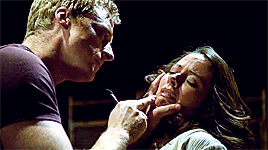

(also, like, there are THREE gifs of Alpha that I can find. THREE. How? Is? This? POSSIBLE??? How am I supposed to work in these conditions?!?)
Anybody else see any other parallels between Spike and Alpha? Or maybe between Buffy and Echo/Caroline? and are any of my fellow spuffy shippers also on this ship? if anyone out there loves spike but hasn't seen dollhouse, I'd recommend it, also please talk to me, I need people to talk to about my new hyperfixation/problematic blorbo...
#spike btvs#alpha dollhouse#dollhouse show#dollhouse 2009#spuffy#long post#meta analysis#it feels like whedon kept trying to write a certain kind of bad guy#to make the “good guy”/intended love interest look better#but inadvertently creating a way more interesting character#that has internal drives that actually push them to grow into better people#and that end up understanding the main character on a fundamental level
13 notes
·
View notes
Text
Season 2 thoughts on character growth, and whether there was any...
I respectfully disagree with some of the viewpoints that the choices made at the end of s2 brought the characters right back to where they were, or that it undid all the growth they went through during s1.
The MAIN reason I say that, is this:
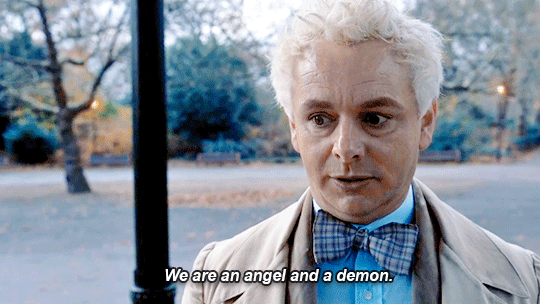
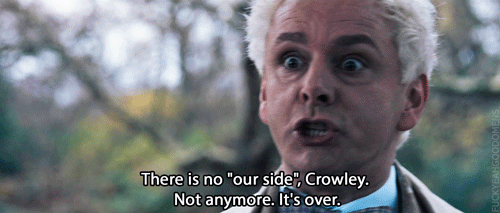
The final scene mirrors the bandstand scene SO much.
Crowley is asking them to run away together, and Aziraphale is saying they can't. Or, he won't.
Crowley is not tied to either side, he is tied to "us". Aziraphale is tied to Heaven.
But it's not the SAME argument. At the bandstand, Aziraphale is pushing Crowley away. Crowley WON'T and CAN'T join him in Heaven, but Aziraphale cannot find it within him to leave. Heaven is the source of good! It is godly! It is everything just and right in the world! He has to do a lot of gaslighting to himself to believe that, but that's where he's coming from.
He's telling Crowley it's over, they're not on the same side, they can't be together.
The argument in the bookshop is very, very similar, but fundamentally different.
This time, they are both screaming their love for one another. They are not TRYING to push the other away, they are both pulling on opposite ends of the rope trying to pull the other one back to them.
Aziraphale still has not let go of Heaven, but this time he makes it clear: Heaven is BROKEN. Heaven SHOULD be all of those things that Aziraphale thought it was, but it isn't. But maybe he could fix it. And he doesn't want to fix it alone -- he WANTS Crowley, he NEEDS Crowley.
In season 1, Aziraphale's mindset was, "I just have to talk to the right people, and THEY will fix everything."
In season 2, Aziraphale's mindset is, "There are no right people, we have to BE the right people. I can fix Crowley, and then WE can fix everything and Crowley and I could be happy together."
That's not to say there aren't things that have stayed the same, things that they haven't learned yet and still need to.
I think one of the things that Aziraphale doesn't understand yet though -- and one thing that he STILL needs to realize -- is that the problem isn't in the labels. One thing that has remained the same is that Aziraphale still sees them as an angel and a demon, and if only he could "fix" this for Crowley, everything would be better, all of that demonic trauma will go away, and Crowley can be the joyous angel he was.
Crowley's side of the argument is very similar, but also different. He hears everything Aziraphale has to say about Heaven, and still opens up to him. He still pours his heart out about his feelings and how they should be together. He doesn't put the walls up until the very end, and even then, even then -- he doesn't just leave immediately like he did before. He kisses Aziraphale, he shows him just what exactly is on the line, and then he watches Aziraphale go.
He isn't going to let Aziraphale just make this decision without having to look him in the face as he does it. He stands by the Bentley, and makes it clear that HE is not the one walking away this time -- Aziraphale is. He can't be in the bookshop anymore -- and what kind of sanctuary is it now anyway -- but he hasn't gone anywhere.
What he still doesn't understand is Aziraphale's point of view. He understands his own point of view, having presumably seen a high-level view of Heaven, one in which he was asked to create, but never told "oh no not like that" until it was too late. Aziraphale was evidently told that. From the very beginning, Aziraphale understands that one mustn't ask questions, he understands that it is not HIS position to create.
Crowley says that extreme sanctions were something they just joked about to scare the cherubs. He has access to high-level material. He clearly has seen Heaven from a privileged vantage point, and he fell from that high place. Aziraphale's demeanor tells me his position was closer to Muriel's -- respect the higher authorities. What Heaven is now, was what Heaven has ALWAYS been for Aziraphale.
Heaven is flawed to Aziraphale, but as a whole it is not that different from the Heaven that was, when Crowley was happy there. I don't think that Crowley understands why Aziraphale doesn't understand why he can never go back. I don't think he understands why Aziraphale can't see that it isn't just the fall that hurt him, because Aziraphale doesn't feel the enormity of what Crowley lost.
What is interesting is that now Aziraphale will get to see, when he's "in charge". I think that season 3 will see that growth in both of them -- I think Aziraphale will finally understand that perspective.
And I could also see that maybe Aziraphale will find a way to make a difference. Maybe it irrevocably changes Heaven and Hell forever. Either way, I bet it will take both of their perspectives together to make it work, and both of their perspectives will change for the better so they can finally let go of everything that happened and finally be fully free together.
410 notes
·
View notes
Text
This is a rant I've been meaning to get off my chest for a while, but the conception on Tumblr, AO3, and sometimes here, that Jake is capable of "teasing" Dirk, and all that implies, irks me deeply.
Let me be clear: Jake English is not self-aware. He, in Canon, never does anything resembling self-awareness, maturity, emotional boldness, or anything else that requires a spinal column. This includes apologizing to anyone, talking about his problems in a way that doesn't end up being selfish, teasing someone, particularly Dirk, or transitioning. (I maintain this especially; he does not have the boldness, maturity, self-awareness, or nerve to have transitioned his gender presentation pre-Act-6.)
He has an *understanding* of pranks, if we allow Paradox Space as evidence, but that's it. He makes *Tavros* look like a fully-roleplayed-into-Class-shift Lord.
You know what the popular Fandom perception of Jake, as a member of a DirkJake relationship, lines up with? *John*, before his main writing trait became a deep, all-consuming depression and repression thing.
Like, John’s original Act 5 and earlier characterization before his underreaction to his dad's death and the spiral that sent him down towards his current "transition would not save her" characterization is what people use for Jake (charming, funny, actually seems to have his shit together enough to maybe be transmasc (man, remember *transmasc John*?), and, most importantly, seemingly capable of dealing with the levels of vaguely sociopathic bullshit that an even-close-to-accurate Dirk would throw at him), but DirkJohn/JohnDirk is less popular, to the point of not having a consensus order, simply because Jake and Dirk are *coded* as liking each other.
I think a lot of people miss that DirkJake is fundamentally the Equius of relationships; Hussie isn't one of those writers that feels pride in finding pathos in the ridiculous, but spiteful glee and humor. He genuinely does not care if he accidentally touches people's hearts in a way that doesn't involve Dave, or *maybe* Vriska. The fact is, DirkJake is a joke relationship, which is spelled out very clearly in their conversation.
You know, their conversation. The one they have together. The time we see someone who is actual Dirk Strider, not Hal pretending, not Aranea co-opting a memory, not a Brain Ghost, talking to Jake. That time.
Yeah, that doesn't exist. DirkJohn has as much conversational basis as DirkJake.
Edit:
LESS! GAME OVER! "I FAILED"! LESS!!!
DirkJake is a joke, a long, subtle one being made on everyone who saw Dirk's affections and immediately wanted him to get together with his disabled(?) ongoing harassment victim. Hussie was having a lot of fun making it seem like Jake found it important in the Masterpiece, I'll tell you that much.
@thelifetimechannel/@geejaysmith/@clonerightsagenda did magnificently wringing blood from this stone, I really do mean that, their Alphas are genuinely written better than Canon for 3/4, but that's all it ever was; every DirkJake writer is the YouTube comments under [this video](https://youtu.be/B7bpv5xyrOY?si=wYTCFDHM5ZzOY8fp) saying Equius could ever have been more than what he was.
TL:DR
1, Jake is pathetic, and we should remember this.
2, Hussie is a jackass who hates us one and all for the sin of caring and everything he has done with this franchise since maybe EOY2 has had an ulterior motive, and we should remember this.
3, Most people who write longfics set in SBURBless AUs, whether normalcy or fantasy, and want to ship Dirk and Jake should really be shipping Dirk with John, since now that history of Dirk-Jake interactions that justifies the ship in-Universe is gone at the Author's leasure, John would have the dynamic they want, and they talk *exactly as much*.
4, If you want to trans Jake, [there's a sensible way to do that](https://archiveofourown.org/works/8619856), but there's no in-character way to make him transmasc.
5, Read DDOTA, I beseecheth of you. Like yeah the Striders are emotional to a kinda weird degree but apart from that they really got everyone down right.
#dirkjake#dirk strider#jake English#pistol pony rodeo#Alpha kids#alpha kids meta#Homestuck#Homestuck meta#hs meta#dirkjohn#johndirk#dirkjake meta#double death of the author#ddota#tlcstuck#equius zahhak#andrew hussie#hs fic#hs fics#hs fic meta#transmasc jake#jake meta#jake english meta#jakedirk#john egbert#dirk strider meta#Homestuck shipping meta#hussie
88 notes
·
View notes
Text
ok Worm Bigotry Breakdown in more detail for @silverflyingpikachu
tl;dr: author is Cishet White Guy From Canada In 2011. he ostensibly thinks he is progressive. this does not change his proclivity for tossing his Cishet White Guy From Canada Biases into the books and then saying even more bigoted things in defense of those writing decisions on forums. wildbow is just some cunt on the forums with bad opinions on wildbow's writing. the book is 1.7 million words long but i believe in my ability 2 categorize this shit with decent accuracy. everyone who has ever said worm's CWs can't be categorized, including wildbow himself, is a lying ass bitch. this will include some vague spoilers, because i can't really go in-depth without a few examples, but i'll stay away from anything too plot-critical.
racism:
- worm is fundamentally a book abt systems of power and the ways in which they suck. some of the critiques worm issues--e.g, its depiction of how school systems enable bullying, inspired by wildbow's own experiences w/ the school systems as a deaf kid--are viscerally accurate and incredibly compelling. but wildbow fundamentally doesn't understand how certain systems of oppression work--e.g policing--and subsequently, his attempts at depicting them occasionally fall flat onto their face and land in racist territory. this gets particularly nasty when combined w/ the White Guy Author propensity for racist stereotypes--for example, his chosen face of police brutality is a black girl portrayed as predatory & animalistic.
- who is also one of the only black people in the book overall, alongside--for example--an addict portrayed as having less interiority & being less deserving of empathy than A Literal Fucking Nazi. also, the main characters have to team up with the nazis "for the greater good" (defeating the mean asian villains) at one point. it is a mercy to the readers when this part of the story ends.
- there are two black characters in the main cast. for the first, wildbow just Straight Up Forgot to include the most compelling aspect of their background + characterization in the text (it was provided via WoG instead, which i provide to all wormreaders like a fuckin' DLC patch when they get to where it's relevant) & entirely forgets they exist towards where the end of their character arc should have been. the second is introduced w/ the most misogynoiristic description on the planet but blessedly has a largely compelling and well-written arc as the book goes on.
- depiction of china is just like. fox news level sinophobic "it's all a brainwashed indistinguishable evil cult" shit. not relevant for very long relatively speaking but insufferable to read. asian characters are also like. we got Brutal Yet Honorable Asian Man. we got Fiery Asian Girl With Blue Eyes. it fucking blows it's not good
- oh yeah forgot this one someone mentioned in the tags. #it's an insignificant paragraph and nobody talks about it but the part where it goes #“yeah literally EVERY cape in South America is with a cartel and the heroes are barely distinguishable from the villains” #fuck you #not that the others aren't bad the fatphobia gets really gross but nobody mentions this and that one got me so yeah typical Insufferable Awful Imperial Core Author Understanding Of What Other Countries Are Like
- i could make this section one million bulletpoints long but the gist is summarized i think--wildbow's varied racist biases leak fucking everywhere, into character design, into narrative assumptions about who's deserving of interiority/empathy or not, into attempts at Saying Anything About Society, into which characters he prioritizes, into who he offers validity via the narrative, etc etc etc.
homophobia:
- theres a girl named amy dallon in it and she is the worst lesbophobic stereotype ever known to man. no other Problematic Lesbian™ you can think of has anything on this girl. the worst part is that she genuinely has a decently compelling character concept and arc, which her being awful is integral to, so you might accidentally find her interesting anyway and then she'll move into your brain
- wildbow kept accidentally writing characters that scan as massive dykes and then got really mad about f/f ships for the book being popular in the fandom. he responded by making a deranged forum post involving the phrase "pandering is pandering" insisting everyone (but the bisexual "hedonist") is straight and writing a scene into the book where one of the characters literally turns to the camera and tells the readers "not to get the wrong idea" about her hugging her friend.
- over the course of 1.7 million words he finds excuses to loudly inform you that all of the relevant female characters are straight and it's sooo shoehorned in you can always tell when he's doing it
- basically worm is like if naruto was about homoerotic teenage girls who do violent terrible things, in terms of levels of unintentional homoeroticism, and the author responds to ppl going "lmao gay" about the unintentional homoeroticism with poorly restrained seething rage
fatphobia:
- generic brand of fatphobia you'll see in p much all mainstream media where only side/bg characters are fat and it's obliquely used as a descriptor to indicate that someone has negative personality traits or should be viewed as sort of gross
anti-addict shit:
- wildbow generally likes writing about how social circumstances--i.e neglect from society, oppression, failure on behalf of systems--causes crime. he generally likes demonstrating the ways in which the villainous main characters are traumatized teenagers failed by society fumbling to keep existing & holding each other up through The Horrors. unfortunately all of this intelligent writing flies out the nearest window when addicts are involved. there is a gang comprised entirely of addicts, all of whom are portrayed as disgusting, violent, dangerous, and of course often racially stereotyped. it is a mercy to the readers when they're no longer relevant to the story.
- on a more subtle level, characters are every so often just like. a little more anti-drug than they would realistically be and you can tell it's wildbow's opinions leaking into their characterization. this is largely what the anti-addict writing is kept to after The Addict Villains leave the story iirc.
if youre wondering wellwhy does anyone read this book then. to that i would say that unfortunately despite it all it'sa fucking excellent book. so we all carry on reading the parts that suck and thinking about how they suck and then reading the parts that fuck and going "ouuugh my god" and rolling down 20 flights of stairs about how hard they fuck.
#sorry if i missed anything this entire post was written while so tired#parahumans#apparenty people lke this one so ill maintag it in case anyone finds it useful its very slapdash though
237 notes
·
View notes
Note
hi!! i saw your other post about how you simplify details and it was really helpful - was wondering if you had any tips abt drawing expressions/poses to express a story/emotions. like i saw your recent sumeru char doodles on twt and the way you draw alhaitham and hungover kaveh is so!!! ahh!! all of the lines feel really intentional, from the expressions to the fabric of the clothing and omg i love it so much. anyways sorry for rambling HAHA thank you sm for sharing your art! gl w art school 💪
Hello!
Thank you so much for the lovely words <3 it's really such a honor to hear that so many people consider my art to be very expressive, which I think is an essential skill to have for storytelling in comics!
First of all, I'd like to say this isn't something I can easily answer... you must already know there's no easy step-by-step guide on how to be "good" at art or expressions or whichever aspect you're trying to improve, the answer will always be observation and practice. However, I can tell you some of my methods I use to make sure emotions are conveyed as efficiently as possible(?). Here are the key points I always try to apply (note that these aren't rules, these are just my guiding points):
Understanding the character(s), the context, and how the two work together
Laying down a foundation
Not letting dialogue be the main driving force behind storytelling
Paneling conveys emotion too, actually
The absence of something can also convey emotion
You didn't specifically ask about comics, but since it's my favorite subject and it ties into your question, I'll be using a lot of examples from the comics I made! And it might interest other people who were curious?
VERY long post ahead :)
1. Understanding the character(s), the context, and how the two work together
This is what I think is the most fundamental part of storytelling! I mean, makes sense, right?
Obviously you don't need a PhD in The Character to make stories based off them. I literally cannot tell you every detail about my favorite characters despite loving them very much, but I think understanding them and their relationships on a big-picture level is primordial. What drives them, what are their principles, what are their biggest fears, who do they make exceptions for, etc.
Also, to me, understanding their relationships is sometimes more important than understanding the character at a molecular level. We can tell so much about someone just from the way they interact with specific people vs how they interact with strangers. The person I am online isn't the same I am with friends nor even with family-- like one of the reasons some characters can feel one-dimensional is because they don't show variation in their character throughout their relationships (and since you mentioned Kaveh and Alhaitham, I don't need to tell you the way both of them interact with each other is far removed from the way they interact with friends, strangers, etc... I think a lot of people forget who they are outside of their relationship, which a huge point of contention behind mischaracterization in fan works).
I don't have much to say about this other than this is something I keep in mind every step of the way through.
2. Laying down a foundation
This is what the majority of my comics look like on second draft:
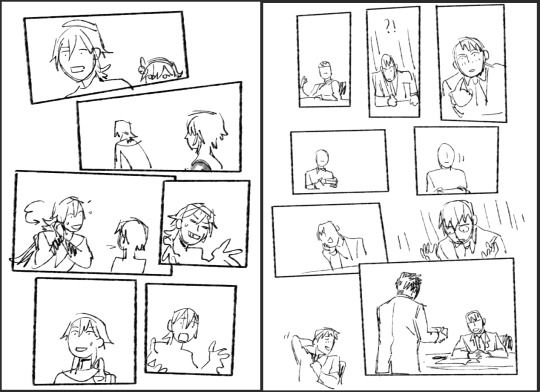
I said second because the first drafts usually look like this, which are barely comprehensible to anyone but myself:
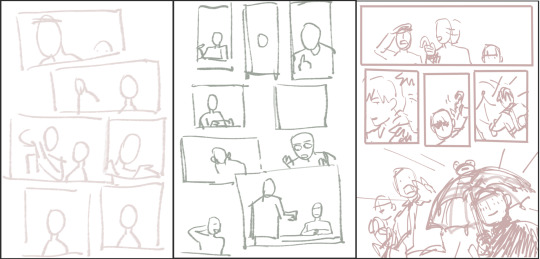
The purpose of these are not only to give me a better guide for posing than whatever i did on the first draft (storyboard), but also have a first pass at motion and emotion. The expressions and gestures are legible enough that you can probably glean the emotions of each character based off the little sketches. Ultimately, some of the things I'll draft will end up adjusted, changed, expanded on or even removed.
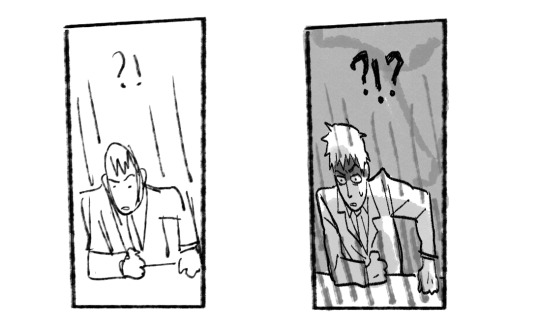
This particular panel of Reigen is a favorite of mine, because the first pass already shows his confusion, but the final one is even more distorted because it felt like it needed to be even more accentuated.

This panel where he mansplains is also a good example, because the first pass gave him too much of an arrogant/uninterested look (notable with his upturned face), whereas Reigen is more likely to take pride in explaining something he knows to make himself look like a wise and mature figure (notable with his slight smirk and downturned face, as if nodding to himself; the hand is also slightly more forward as if inviting rather than dismissing).
And since I basically made an example of it above: body language is super important!
This applies for everyone. It doesn't stop at characters who make grand gestures and exaggerated poses every waking moment of their life, but also characters who are socially awkward, private, reclusive...
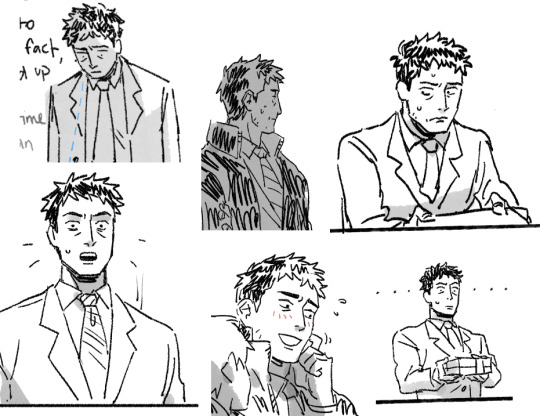
The posing here is intentionally stiff but not entirely closed off, giving the sense that he's earnest, tries his best to make connections , but also doesn't want to take too much space, thinking the smallest wrong move could cause trouble.
Also, give room for the body to do its thing. Avoid cropping out things that shouldn't be cropped out. Leave enough room between the edges of the panel and the point of focus to emphasize what you want to emphasize. Close-up shots shouldn't be too frequent (in fact, personally I don't like doing close-up shots but it doesn't mean they're bad or shouldn't be done, again, my word isn't gospel!), especially if what you're conveying isn't too emotionally charged.
Lastly, I have terrible news for people who hate drawing hands. Hands are possibly the second most expressive part of our body (if we don't count the body as a whole), so especially for your charismatic characters, you will very often want to use hands as a tool of expression.

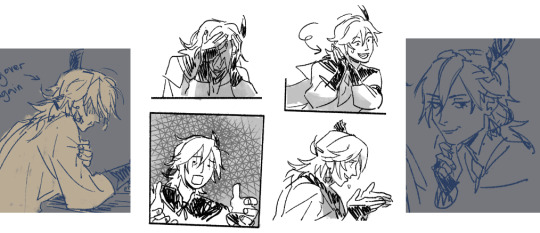
(Think how much emotion and personality would be lost if the hands weren't there!)
3. Not letting dialogue be the main driving force behind storytelling
With my comics, I play an incredibly dangerous game called "I'll think of dialogue as I make the storyboard and then when I'm done drawing every page I'll write the dialogue over it guided solely by memory and whatever I drew". Don't do this. Have a script in hand or write it at the same time as you draft your storyboard.
The reason I do this is because I'm lazy and I don't want to open a simple writing software to type down a script. Genuinely I have no other reasons. Anyway, the only advantage this gives to my comics is that they will generally be able to stand on their own without much dialogue; obviously dialogue is essential, but what I mean is that we don't need it to have a pretty accurate read on the room.
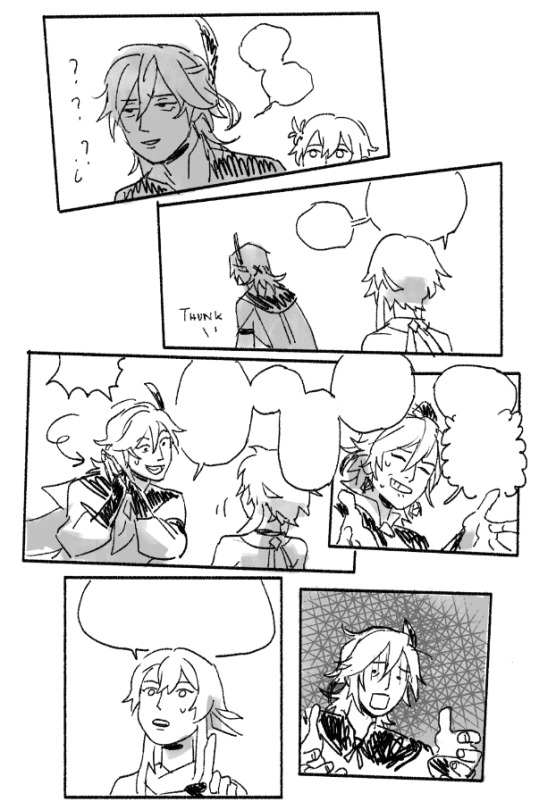
For example, if I remove all the dialogue from this page, you probably can't guess exactly what's being discussed. However, you can identify through their emotions alone that there is disbelief, bargaining, and finally a pretty devastating info was dropped.
Alternatively, cutting down dialogue from your page and leaving room to expressions/body language alone can be entirely more beneficial than having any dialogue to begin with.
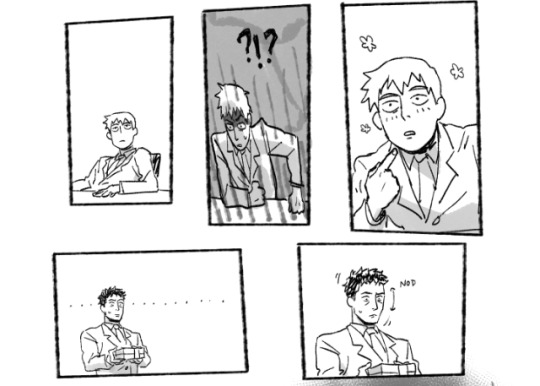

AKA Readers aren't stupid (some may be, but the majority can extrapolate just fine). You'll realize how much you don't need words and how your stories can be even more funny/impactful by pushing forward visual storytelling.
4. Paneling conveys emotion too, actually
Being a "good" artist isn't enough to make good comics. The way you panel things is extremely important, because it sets the tone, mood, pace, you name it. Some of the best works out there are the ones with the most care put into the flow of the comic. You need to understand how people will read it, and it starts with what order you deliver the information and how.
This is paneling 101, but a page with irregularly shaped panels, multiple changing camera angles and such will be exponentially more dynamic than a page where each panel is the same size, have similar compositions and/or repetitions with little to no diagonal or curved lines of action.
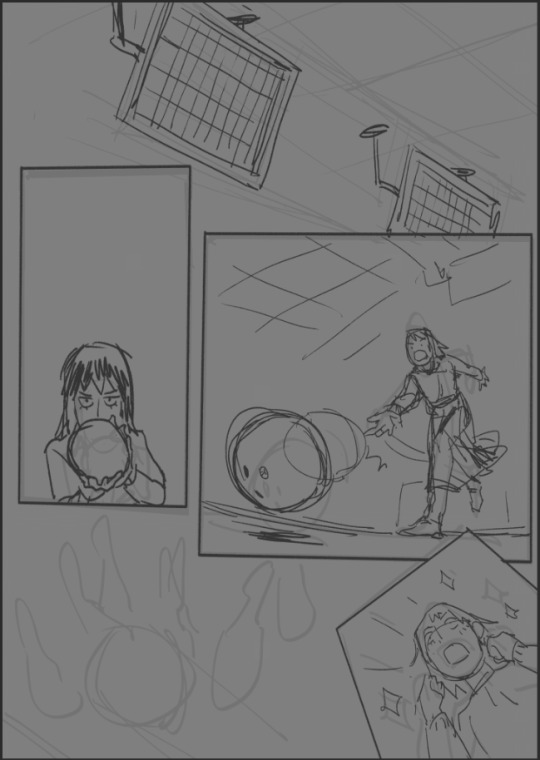
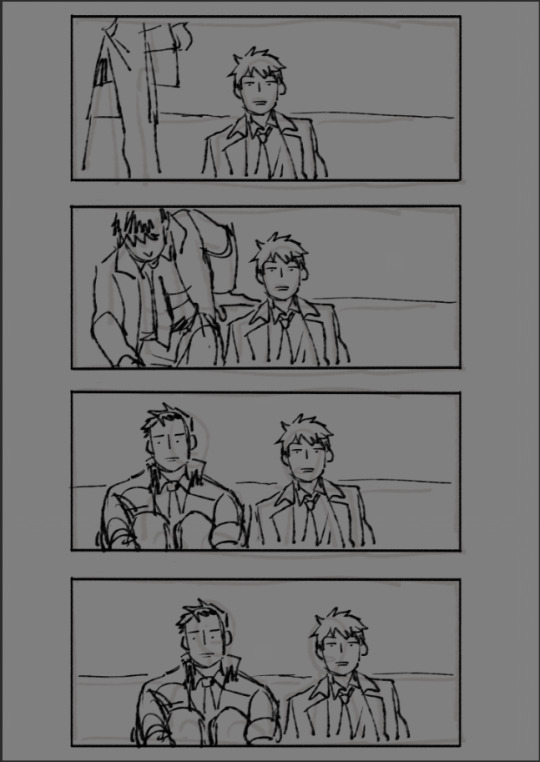
The two examples above are WIPs from 2 different stories so unfortunately you'll have to make do with the rough sketches. That being said, you don't need to know the context of either pages to know the kind of emotion that should be felt through the paneling alone.
Give time for the important emotions to be processed by the reader (unless it's intentionally fast-paced). Every emotion that needs to be emphasized should have its own panel.
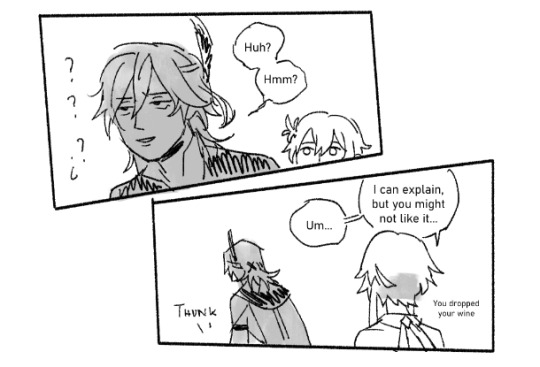
In this example, I could easily have condensed these two panels into one by transferring the dialogue from the second into the first and jumping on to the next action. However, it would undeniably give much less impact to Kaveh's disbelief.
On an inverse situation, sometimes you will want to condense two panels you made into one, because whatever those two panels are doing are perhaps not important enough to deserve separate panels!
Lastly, you can notice that the space on the page is not always filled. Leaving space between each panel and/or between the edges of the page gives room for the reader to breathe and slows down the flow; and inversely, if you want to make the situation more frantic, make everything look more tight and constricted.
5. Not showing facial expressions sometimes conveys more emotion than doing so
This ties nicely to the point I made about body language. You don't need to see a character's face to know what they're going through, necessarily. Sometimes, their posture or their dialogue is enough. In my opinion, a story is more compelling when this equilibrium of facial expressions / body language / paneling / dialogue is correctly adjusted-- you will not need to have all the elements to convey the message or it could be a little overbearing.
I don't have many examples for this one because they tend to be more relevant in dramatic scenarios, which I haven't done that many of.

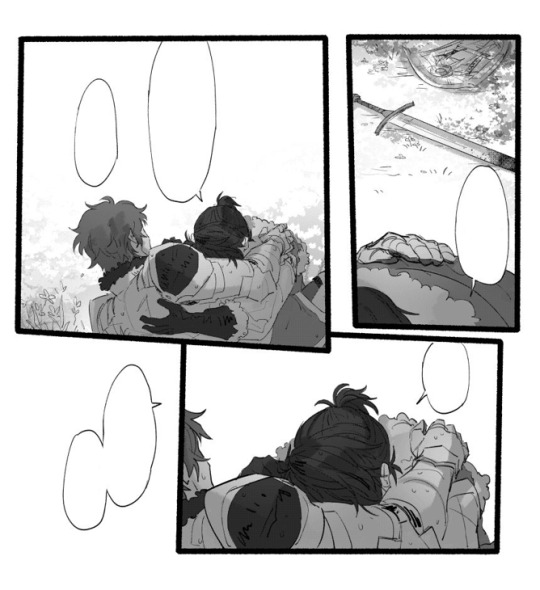
(The first one is once again from a WIP)
And that's about it for my insane guide on comic-ing. I hope ANY of it made sense.
***
Here's a round up of extra tips, focused entirely on the drawing part which might be more of what you asked to begin with :'D
- That little line/wrinkle that adds so much character
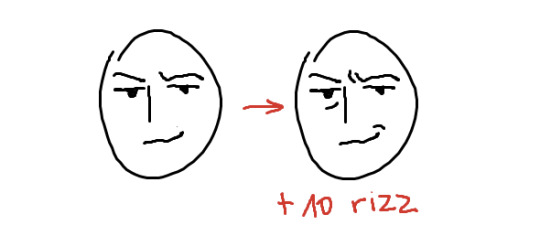
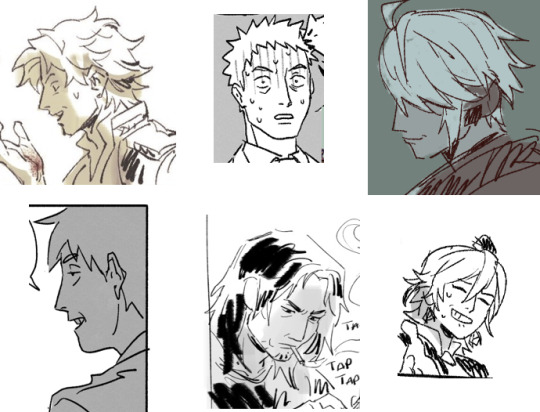
Yall know what I'm talking about. In my opinion, too many artists are afraid of giving laugh lines/wrinkles because it makes their characters look older, except when it's to add those sexy sexy eyebags. I'm encouraging everyone to add them to their art little by little and see how much it can improve the expressiveness! Obviously, I don't use it everywhere, but it's a very effective way to make your expressions feel even more... well. expressive.
- Line of action
You've probably seen this picture going around before, from Preston Blair:
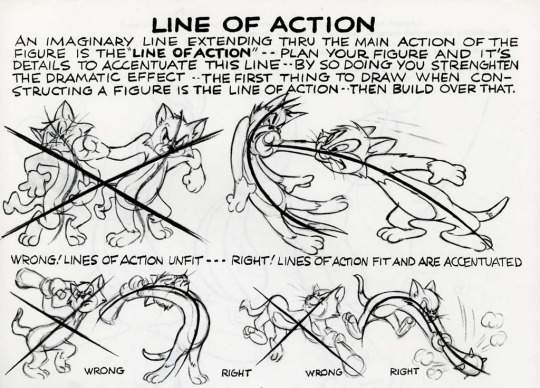
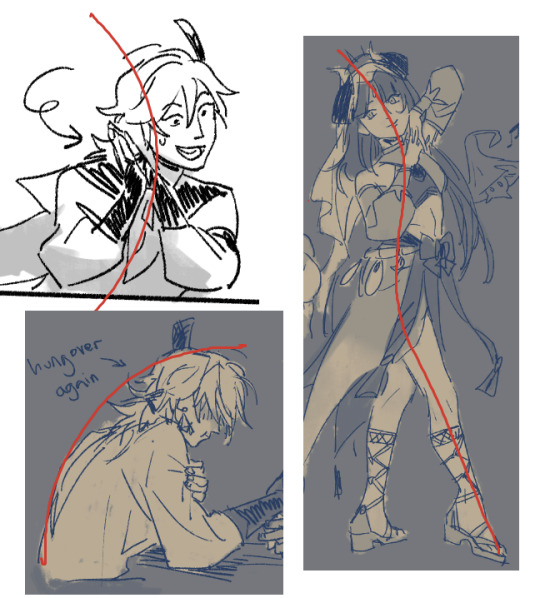
Although it's called line of action which implies action, this line is important even when the character isn't really in action.
You can gain a lot in expressiveness when you think of the body as one whole fluid instead of a sum of multiple disjointed parts. This is why drawing a very rough base comprised of only lines and circles can help figure out if the posing works before you start refining it.
On a different note, animation principles work very much in comics as well! I recommend looking up animation guides especially those that show how to make key poses.
- Shadows and/or color fill
This is one I will use quite often for different situations.
Shadows can immediately set a tone when they're used dramatically. For example, a shadow over a character's face can convey unease and/or evil intent.
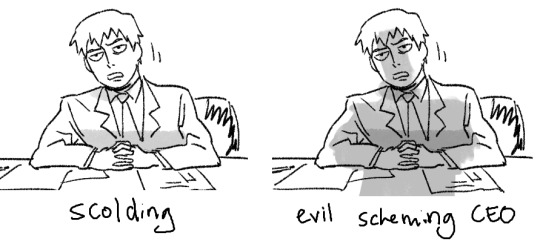
On the other hand, I will use color fills for different purposes:
Differentiating ground layers
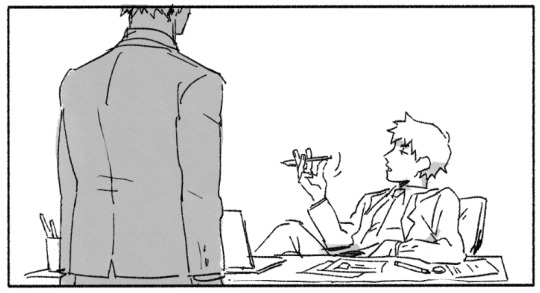
This can help with readability.
2. Conveying a certain mood
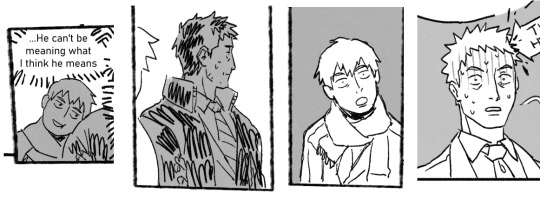
It can separate the character from the color of their background to give a sense of isolation, reflection, realization, being disconnected from their surroundings, etc...
- Don't be scared of using codes / tropes / archetypes
...As long as it benefits the narrative, of course. By codes / tropes / archetypes, I mean posing or expressions or visual effects that are universally understood and used for specific expressions. The semicircle sweatdrops and blush made with slashes are incredibly typical of manga/anime, but it doesn't mean they're bad! Visual effects are there to help remove the ambiguity of an expression considering a single expression without visual codes could convey multiple emotions!
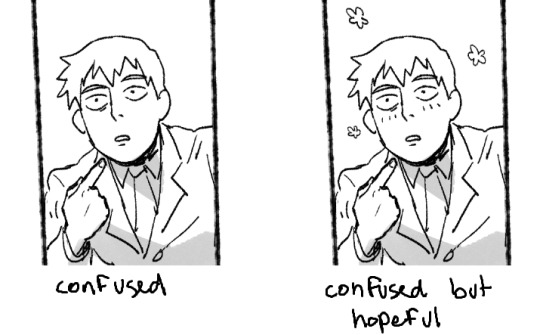
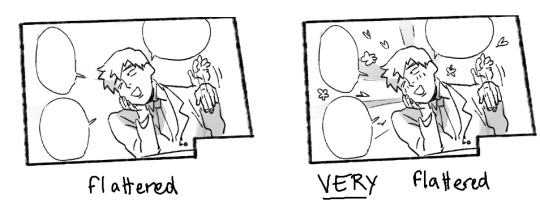
- Find what inspires you and take notes!!!
In my case, what greatly shaped my art style to what it currently is: One Piece, the Ace Attorney series and Mob Psycho 100 (yes, I only watched the latter last year but it still managed to become a source of improvement/inspiration for my art even at my current level, because you'll never stop improving :) )
I hope this wasn't too long or too off-topic, and I hope it can also help other people who might be interested! Thank you for reading!
#oh my goddddddd this is long im sorry#i kept adding onto it as i got new ideas#art tips#not art#inbox
260 notes
·
View notes
Text
Oh when you used to sing it to sleep
@jinkieswouldyoulookatthis and @blue-chimera - thank you both for your kind and thoughtful replies to my reblog of this post. The og post is getting quite long and also I don't want to put too much writing effort into a reblog that's susceptible to disappearance, so I'm continuing here instead.
I agree with you both that Dean's parentification and Sam's continued acceptance of vs rebellion against it as an adult are an important part of their dynamic. Dean's dying words in the finale attest to this beautifully (as well as many other things throughout the course of the show); I love you so much, my baby brother. To a certain extent Sam is Dean's baby and always will be.
I think though to a large extent, the framing by both Sam and Dean of Dean as Sam's parentified elder sibling is a mutually employed, mostly cooperative sanitization of the central and most damaging aspect of the roles they internalized through their upbringing: Sam is a monster and Dean is the tool to "take care of" it (double reading of "take care of" 100% intentional on my part). Because of this, while readings of spn through the lens of Dean's parentification are definitely valid, I do think they sometimes risk distorting or leaving out important aspects of the characters' personalities, motivations, and relationship.
Jinkies, in my fruitless quest to process without reblogging a take I knew the OP wouldn't appreciate, I had listened to the interview before posting, and I think while Jensen is being flip, he's also getting at what he sees as a truth in the brothers' relationship. I think he's right from a Doylist/co-creator/actor's perspective--Sam is the protagonist who we see through Dean, the deuteragonist's, eyes. Dean, as a piece of the narrative artifact, Supernatural, is there to save Sammy in a way that Sam (up to that point anyway) is not a piece of the narrative artifact whose purpose is to save Dean. From a Watsonian/in-universe perspective though, I think he's mistaken, and that his mistake is the reason his take sounds uncharitable, even aside from the flippant part.
It's just not a very convincing analysis imo to frame a character who spends the first few seasons rejecting immoral power, the next few in an arc that ends with him willingly subjected himself to eternal torture for the good of the world, and the one after that intending to sacrifice himself dramatically to rid the world of one particular species of monster but doesn't because Dean asks him not to, as self-absorbed or not particularly concerned with his effect on others, including on his brother. Likewise, Dean holds up well as a parentified older sibling with no sense of internal self and abysmal self-esteem in some ways, but in others not so much. He does have interests and priorities and a sense of purpose outside Sam. They're all over spn every day, much more so in fact than Sam's are. They're just not enough to override his Sam prioritization.
The main place I think this analysis fails on Dean's side though is that he, as an adult, is just not a very good parent. Obviously as a child he couldn't be expected to be a good parent (or a parent at all) and as an adult he's already damaged and so it's understandable that if big brother-ing Sam is how he chooses to spend the rest of his life, he may still not be equipped to do it. But he fails on such a fundamental, obvious level at the the most basic aspects of parenting--providing safety, unconditional love, and preparing your child to go out into the world as an independent adult--in ways that once he's a grown up are absolutely within his power to at least attempt (for example: if he wants Sam to be safer, it would ultimately have failed because of Fate, but the logical thing to do first would be not hunt. Dean could've followed Sam to Palo Alto. He could've told him to go to Harvard Law if he can't tolerate Stanford after Jess dies. Could've refused to support him throwing his life away of a mission of revenge. Bought him his own car, encouraged him to have his own tastes. Told him convincingly that trusting Ruby was a bad decision but Lucifer is still not his fault).
None of that is meant to be insulting to Dean though, because I don't think that parenting Sam is Dean's real job--even from Dean's perspective--and I don't think his real job is palatable enough that it would be better for either of them if he admitted what it is head on. What his and Sam's real jobs both are imo is being a container for Sam. On Dean's side, this means holding Sam in his arms with love or if that's not enough, holding him in the panic room, which, from this perspective, is also an act of love. Substituting his judgement for Sam's is an act of love. Not encouraging Sam to hold his own interests first or to grow towards independence are acts of love. Given the nature of (what I believe to be) Dean's actual job, they are effective and competent acts of love undertaken under impossible circumstances, even if the results are sometimes pretty horrific. Because they're still better than the alternative.
Likewise on Sam's side, doing his job well means being a model monster--go to an Ivy, exercise, eat healthy, cultivate empathy, don't have desires of your own, hold yourself to an impossible standard, suppress your anger, kill other monsters when they get out of line. And in the moments he can't manage all that--because who can?-- submit to Dean. When he does those things, he's succeeding at his job, and while it would be nice if "let your brother hit you" or "jump in the Cage with Lucifer" wasn't his job, in the world of spn, it is. He is right to be contained by Dean and wrong to have opinions or priorities of his own unless Dean approves them first.
I do think this sometimes ends up looking like Sam has better self-regard, because Dean's job is to "take care of" Sam, and Sam's job is also to "take care of" Sam. But actually they both have absolutely abysmal shit self-esteem. "I should submit to eternal torture because it's my fault someone else is going to do terrible things he could choose not to do if he wanted" is not the thinking of a person with healthy self-regard. The reason neither of them could fill a thimble with their self-esteem or healthy boundaries imo is because neither "monster" nor "blunt instrument" is a person. Neither of these roles is better or more healthy than the other. Fundamentally, if you don't see yourself first and foremost as a human person, then your life is going to suck horribly. And neither of them see themselves that way.
#spn meta#sam winchester#dean winchester#my meta#discourse in the linked post#long post#i am ofc like all of us to some extent projecting#some of you have been fortunate enough to not have had a monster to fail at 'parenting' and it shows
82 notes
·
View notes
Note
katara isn't sutble at all in her interest in aang i think zutaras have their blinders on if they can't see how much she was into him. its why i find that fandom so frusterating i've never seen a pairing that was so obvious and yet they act like it was one sided.. when katara was all into him since ep 1 to wanting to run off with him when he got banished. if that dont scream girl is gonna fall in love with main character i dont know what does.
in order to understand katara’s feelings for aang, you need to understand katara’s character at a fundamental level. unfortunately, many, many people in the fandom do not and refuse to understand. for an example, a common misconception is that katara crushed on jet because he was the tall, good-looking “bad boy” archetype. while she did have an instant infatuation for jet because he was tall and good-looking, he was also brave, charming, and heroic and a natural leader to her - all components that katara’s described about aang throughout the series.
“You’ve been training for this since the day we met. I've seen your progress. You're smart, brave, and strong enough.” Katara in Nightmares and Daydreams.
the depths of katara’s love for aang can be seen in the ways that she speaks about him:
“Aang is the bravest person I know!” (The Storm)
“Please don’t go, Aang. The world can’t afford to lose you to the Fire Nation. Neither can I.” (The Winter Solstice Part 2)
in the ways that she’s fiercely protective over him:
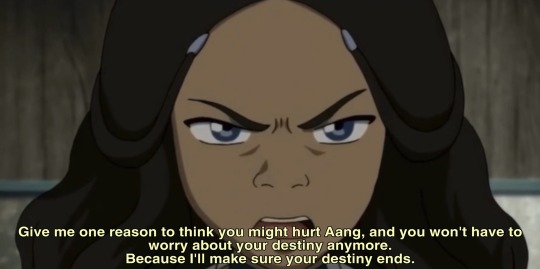
in the ways that she’s physically affectionate with him:
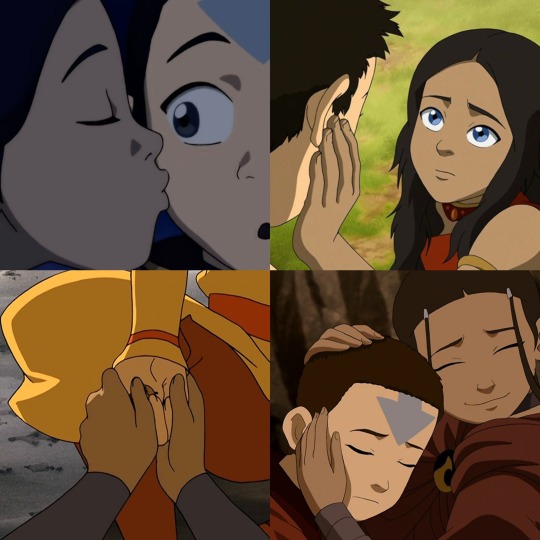
in the ways that she gets immensely happy when he acknowledges her power or calls her heroic:
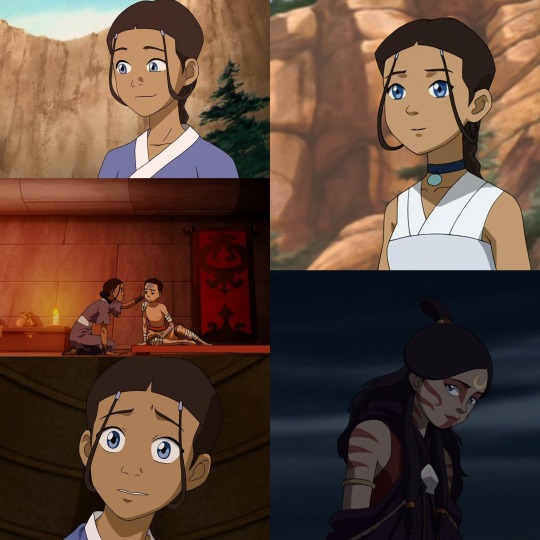
in the ways that she cries when they’re apart:
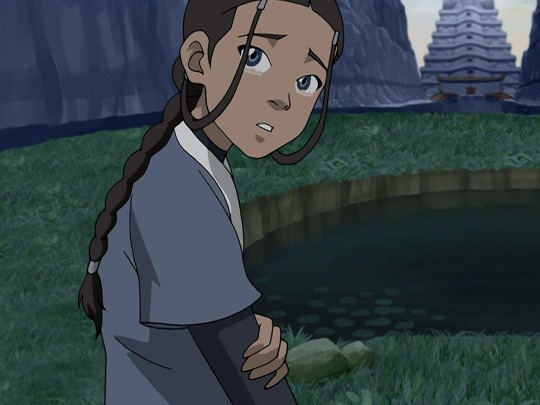
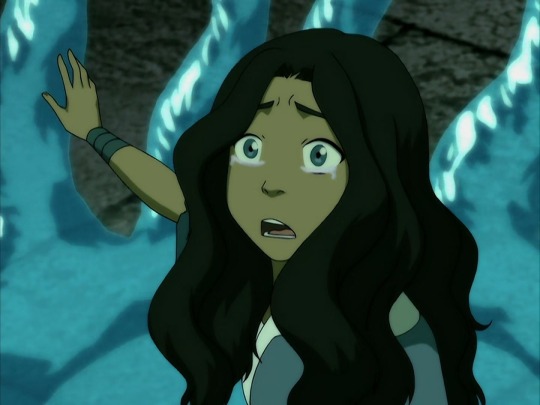
and in the ways that she cries when they’re reunited:
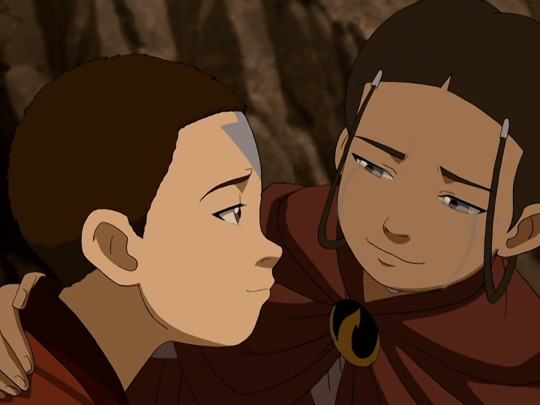
or when he tells her how much she means to him:
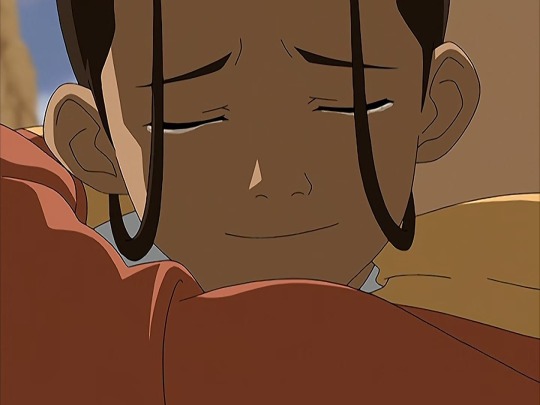
I mean, after they get through a really emotionally charged moment, or overcome danger or death, just look at the way she looks at him. look at the way she hugs him.
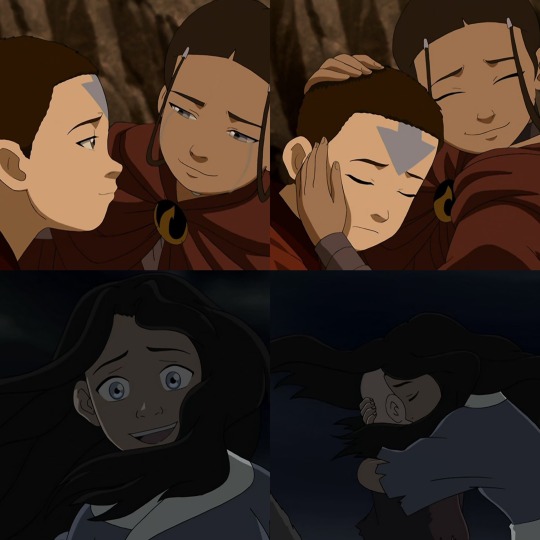
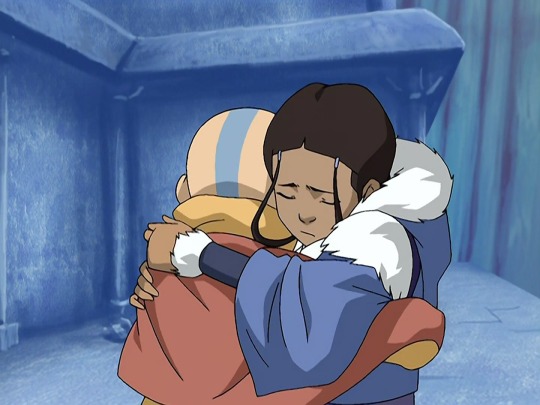
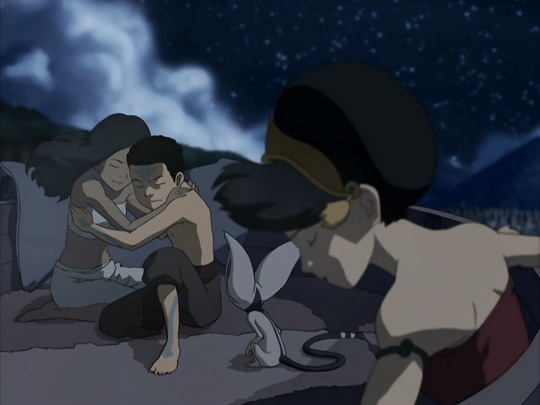
only in the atla fandom will someone look you straight in the eye and say that character A kissing character B (after the characters literally had an implied cave kiss) on the cheek before they’re separated isn’t meant to be romantic, but rather maternal.
and okay, I’ll give them the benefit of the doubt: it’s true that katara’s feelings were intended to be “ambiguous” up until the climax so that we don’t get any canon verbal confirmation that she was in love with aang. i am critical of that. but nothing in the narrative suggests that katara ever viewed aang as a brother or worse, as a son. katara herself does not admit to that when aang brings it up in the ember island players episode, even when she had time to state that she did view him as a brother or, at the very least, did not see him as a love interest.
if you believe that the ambiguity of katara’s feelings for aang is far too much for you to ship them, that’s fine by me. but at the same time I’ve seen people say that katara had feelings for haru just from one blush. or feelings for zuko from their conversation wherein they bonded over their mother’s deaths in crossroads of destiny. if the hug at the end of the southern raiders can be read as romantic by these same people, why not the many hugs, cheek kisses, face touches, and emotional reactions katara feels towards aang? i do have to believe that the reason why it’s so hard to view these as romantic for people is because aang does not look the part of the stereotypical romantic lead, ie he’s bald, younger than katara, and shorter than her.
183 notes
·
View notes
Text
The Undeniable Queerness of Enchanté the Series
(thank you @ranchthoughts for letting me ramble about this in your inbox before turning my thoughts into a post)
there are bls and then there are bls. right? there are dead fish kisses and there are characters who kiss each other like their lives depend on it.
and enchanté firmly belongs in the second category. 1,500-word essay under the cut.
there is such a consistent and tangible queer undercurrent to everything that's happening on this show and i'm not just talking about the fact that several scenes look like they could be the opening scene of a gay porno. or the surprise bondage. or force in drag. or proposing marriage in front of the eiffel tower. no, there's this aching, desperate desire underlying everything. theo has--in addition to his main love interest--four very hot gay suitors who all very obviously desire him carnally... this is some sort of gay manic pixie dream boy wish fulfilment fantasy and i am absolutely eating it up.
there is a vibe to the show that @ranchthoughts called "fanfic-like", and i would argue that that's because enchanté is actually fanfiction of the little prince. (i'm planning on making a separate post soon about how the book was referenced on and used as inspiration for the show.)
enchanté is fully aware of its own fictionality. it is on-the-nose fictional. but that's what makes it so much fun--it's not trying to be something it isn't.
take the reading memories segments in episode 4 [3/4] for example: these scenes were incredibly cringe, like, full-on bad-green-screen terrible-costumes-and-wigs hilarious-acting cringe, but fully aware of their own cringe-ness. (also, gawin was both in drag and naked in the same scene as two different characters, like. get on enchanté's level.) (incidentally, can anyone tell me what character aou/phupha was supposed to be? i got detective conan, monkey d. luffy and momotarō for the others, but i'm stumped on phupha's character.)
and that self-awareness makes it camp! there is such a level of camp to the whole show which feels extremely intentional (especially in the first two thirds), almost like a meta-commentary: "this is the genre. we know it's stupid but we love it here", and i adore that. they know the tropes, they know the bl landscape, and they're just having fun with all of it.
and the whole set-up in itself is a queer allegory, isn't it? theo and akk are "from different worlds", so to speak, hindered in their love not just by their complete inability to communicate but also by their forced separation as children. when they meet again, theo doesn't really belong anywhere, he's an outsider both in france and in thailand, he is unable to act the way thai society expects him to act (e.g. failing to show the proper respect to the seniors), unable to get his parents to understand him while being actively lied to by them (the whole ocean of miscommunication in that family deserves its own post), harboring feelings for his childhood friend his whole life but unable to voice them in a normal sort of way, instead falling back on concocting the most convoluted, immediately backfiring plan to try to make akk jealous and get him to confess his feelings first.
theo is fundamentally isolated because he grew up between two cultures, and neither one quite fits him: when he's in france, he is comforted by thai food and the only people he's close with (his grandmother and sun) are from thailand like himself; but when he's in thailand, he can't quite get used to the social conventions and makes social blunders, he is very slow at writing in thai.
it's such a poignant queer allegory in my opinion. they didn't end up making as much a point of it on the show as they could have, but it very much informed my whole reading of the show and the characters. there is a sort of inability to articulate his experience surrounding theo that makes him even more isolated and screams "baby gay in need of a community" to me. having akk share his experience at the end is something that i'm not a big fan of for other, unrelated reasons (might make a separate post about enchanté's ending and why it fell flat for me), but when looking at it through this lens, it is the only way for akk to really get theo, to really understand his struggle on a fundamental level.
which brings me back to that desire i mentioned earlier: theo desires akk, very much so, there are a whole handful of scenes where akk gets close to him and theo closes his eyes, expecting to finally be kissed by him, but more than that, he desires understanding. he often brushes off his own difficulties and has a tendency to be emotionally clueless (for example about his parents' divorce), but what i see most in his character is the desire to be understood, to be seen by akk, for akk to see him for who he is and to love him for who he is. (akk, of course, has been doing both of those things all along. he's constantly taking pictures of theo, he's watching him through his window--with theo's full knowledge--he is always looking at him, he's always loving him.)
it's not inherently queer to want to be loved as we truly are, i believe heterosexual people experience this, too, but in the context of queerness itself, being perceived as queer by other queer people is indeed a fundamental aspect to experiencing queer love (maybe not in gay for you bls, but i haven't heard of much gay for you happening in real life). not to be unscientific about this, but the vibes of the perception aspect of enchanté are just very queer to me, you know?
oh, and speaking of desire: enchanté in general is very physical. there is a level of intimacy between the actors and the camera that seems incredibly intentional: there are several shower scenes, scenes of theo and akk shirtless, TWO (2) nude gawin scenes (though one of those is sadly a fake-out and he is actually wearing shorts), many, many scenes that include bare feet, which is not something i see super often in bl, at least not to the point that i notice the frequency of it.
enchanté is very rooted in the physical reality of desirable bodies: theo is allowed to openly, physically flirt with saifa, even though that's not even his endgame love interest, phupha uses physical touch in his pursuit of theo, natee shows his obsession with theo by drawing his face/body about a hundred times, and akk and theo are wholly unable to keep their hands off each other. i've joked about the intricate rituals, but seriously, they are constructing so many intricate rituals. there are two separate scenes in which they make up excuses to kiss each other's elbows/arms/backs. they keep touching each other in a thousand ways, in every possible way they can that is still plausibly deniable as physical desire--until they kiss while watching that movie and then it's just a game of chicken of who will confess first. because their physical attraction to each other is undeniable. it's obvious. this was really refreshing to see in a genre that so often plays with the blushing maiden trope, and one character is so often made to pursue the other: on enchanté, akk and theo are equally horny for each other. it's not their lack of physical attraction that keeps them apart for so long.
(sadly, the show then shies away from actually getting very sexually physical: after their desperate, stunning, amazing balcony-kiss, they aren't allowed to be horny for each other in the last two episodes, when they're actually in a relationship. this is just one of the many aspects that i didn't like about the conclusion of the story, because you simply cannot tell me that these two as we got to know them in episodes 1 to 8 would really be as chaste with each other as they're shown in episodes 9 and 10.)
leaving that aside for the moment, let's talk about that kiss. as mentioned right at the beginning, when these two kiss each other on the balcony, it's desperation in its rawest form. these two--and especially theo--crave each other. theo kisses akk like he will die without him. theo kisses akk like he can finally breathe. theo kisses akk like he never wants to do anything else ever again.
i'm a bit obsessed with book's acting here, because of all the kissing scenes i've seen him in, i think this is THE most desperate one. force plays it a bit more subtle, but book's expression is full-on anguish. theo waited his whole life to be kissed by akk, and book portrays that so beautifully, with such depth. it's one of my favorite bl kisses for sure, it's played with so much heart, so much feeling, that it's hard to even think of kisses that compare, apart from the bad buddy episode 5 rooftop kiss.
anyway, all of this to say that enchanté to me is deeply, lovingly queer, and it's a shame that so many people are sleeping on it. (and that includes myself, i was wary about watching this show for a long time because i'd heard so many negative things about it.)
but i'm here to tell you: watch enchanté. it's wonderful, it's hilariously funny, it's endearing, it has book and force in it, and it is extremely queer.
127 notes
·
View notes
Text
Madoc is such a fascinating character to me.
Like, this is a guy who really, truly cares about family. Not even in the warrior sense of family honour or loyalty— although that too— but in the most like, cereal-packet, Saturday Morning Cartoon way possible.
On some level Madoc's main goal in life is to come home every evening to a well-cared for, loving stay-at-home wife, and a gaggle of well-behaved, happy children.
It's just that his other main goal in life is unending war and bloodshed, and he seems to be incapable of understanding why those things don't mesh.
Dude has two wives and four kids (that we know of). He loves/loved all of them deeply. He murdered one and almost succeeded in murdering another. Two of them ended up having to be hidden from him in the mortal world for their own safety. Three of them have faced him in direct combat. Literally all of them have at some point either conspired against him or aided somebody else in conspiring against him.
Madoc literally murdered Jude, Taryn and Vivi's parents in front of them. And then took them in and started acting as their new Dad.
He mortally wounded Jude and then asked to be allowed to help her.
He basically tried to invade Elfhame, laid out a plan to establish Jude as a puppet-queen (and we don't know that he didn't know the true secret of the Bridle) and then said that it would be “good to be a family again”.
We're told repeatedly, by Jude, that Red Caps need to shed blood, but we're never really told exactly what this means. The fact that Jude doesn't have any qualms about banning Madoc from using weapons suggests that he probably isn't going to actually die if he doesn't meet his Blood Quota for the century.
Is it an addiction? An instinct? A spiritual obligation? Just something he really, really likes and doesn't want to give up?
Is all the fucked up stuff Madoc does on his path to the throne really just his Red Cap instincts getting the better of him?
Or is it just that we're getting all this from the POV of his daughter, who needs some way to explain in her mind the separation between 'Madoc her Dad' and 'Madoc the General-Turned-Traitor'?
Regardless of how in-control of it he actually is, Madoc's Red Cap status is fundamentally treated by everyone around him as a blank-check for him to be as bloodthirsty as he likes. Even when Jude is actively working against him, she still takes time to clarify, in her internal monologue, that this is just Madoc's nature, that he can't be anything else.
But how much of an issue is it really? Is Madoc incapable of having the family he wants because he's a Red Cap, and Red Caps are incapable of anything other than violence, or because he's a Red Cap, and thus assumes he's exempt from having to make the choice between 'family-man' and 'gore-soaked warlord'?
Is banning him from ever picking up a weapon a punishment because to stop killing people is somehow inherently detrimental to Red Caps? Or because if he survives doing so then it proves that he could have stopped at any time, and thus that everything he's done so far was the result of his own, personal choices?
What would these stories look like from his perspective?
#madoc#folk of the air#fota#holly black#jude duarte#fota meta#meta#folk of the air meta#the cruel prince#the wicked king#queen of nothing
107 notes
·
View notes
Text
This is me working through my main issues with Bathena in 7x01. If you have no issues with the transition from 6x18 to 7x01, I'm happy for you and there's nothing to see here. If you'd do see some issues and/or are willing to help me work through some of them, please continue reading after the cut.
Disclaimer: The long hiatus and my recent cold definitely did not positively influence my experience. I'm aware of this.
Man, I'm so conflicted about Bathena's story in 7x01. I mean, the acting was top notch. The scenes and dialogue? Instant classics. The dancing? Swoooon. And we finally get to explore the foundation of their relationship? What's not to love?
Well, this really feels like the perfect follow up to Season 4. They had just addressed their communications issues and still had topics to work through. They would soon be empty nesters and didn't know how that would impact them.
But this isn't the beginning of Season 5. This is Season 7. Since then we have seen Athena and Bobby go through so much separately and together. They have grown closer and have developed their communication skills and the foundation of their relationship.
They struggled together and supported each other through the Hudson ordeal and the fallout around Harry in 5A. We've seen them make time to focus on their intimate relationship (5x09, 6x13) and to sharing personal history (5x15, 6x02, 6x03, 6x13) and support each other through oh so much personal trauma (5A, 5x14, 5x16, 5x17, 6x02, 6x03, 6x09, 6x12, 6x17). They've put the other's happiness before their own without a moment's hesitation (5x05) and developed a deep and easy intimacy with each other (5x08, 5x09, 5x11, 5x15, 5x17, 6x02, 6x08, 6x12, 6x13, 6x17) without ever losing their individuality in the process. Athena built a relationship with Bobby's sponsor and Bobby shared his AA world with her. Athena allowed herself to be vulnerable with him by admitting fears while she developed a deep understanding of how Bobby worked on a fundamental level (6x14).
And then Tim came back and decided nope, none of this. Gonna reset Athena to Season 4 (when he left as showrunner) and leave Bobby as confused as me.
I love me some good angst and conflict to explore characters and their dynamics. But what explanation were we given for this drastic change in Athena's personality? She is afraid to find out who they are when it's just the two of them? Which we have just seen again and again in Season 5 but much more so in Season 6?
Characters being flawed and acting irrationally is not bad writing. On the contrary, it can be excellent writing because flawless characters are boring and bland. And Athena and Bobby are so deliciously flawed. Have been from the very beginning.
So why not provide us with an explanation for how 6x18 Athena went from happy and confident in her marriage after settling into her empty nest with Bobby for a year, to the neurotic mess we see in 7x01? (A highly entertaining and cute mess, but still a completely different Athena than literally one episode before.)
How did 6x18 Athena, after recently celebrating her fourth wedding anniversary with Bobby and saving him from a bridge collapse, from one moment to the other decide to go to therapy (something she canonically avoids like the plague - see Seasons 3, 4, and 5) and do a 180 on cruises (despite copious discussions of cruises her fear did not come up with Bobby in 5x18, 6x01 or 6x18, with May in 6x01, or with Hen in 6x01, or in the conversation about cruises with her parents in 6x01 despite those two apparently being responsible for that fear)? How did that Athena then board the cruise with Bobby at the end of 6x18 full of joy and happy anticipation after a last minute cancellation? And how did Athena then manage to have a therapist appointment about the last-minute cruise two months in advance somehow?
I'd love to find some explanations for this beyond sloppy writing at best and blatant disregard for the prior story lines at worst.
At this point my only hope is that the next two episodes will shed some light onto what exactly triggered Athena's abrupt change in personality from one episode to the other. (actually retroactively within the previous episode somehow) But I won't get my hopes up too much because so many of Athena's, Bobby's and Bathena's story lines have been left to fizzle out without any kind of explanation or resolutions over the years (under both Tim and Kirsten).
So what's my takeaway here? I desperately want to love this episode. It has so many amazing scenes. But the retconning is making it really difficult for me to process as a coherent story line. And that's on me. Shows do this all the time. THIS show has done it plenty of times in the past.
But I feel so sad that I seem to care more about Season 5 and 6 Bathena than the show itself. It feels dismissive of the growth those two have gone through. And it makes me fearful of what kind of disregard the show might display towards these characters, their arcs, and their growth journeys in the future.
Thoughts? Helpful ideas? Number of a good therapist? 😅️ (One that doesn't just say "I'm sure you'll be fine.")
30 notes
·
View notes
Text
twst 30 day challenge: day 30

what's your hottest twst take?
final one! so i've got two hot takes, and the first one is this: i'm completely fine with twst not having any romance or not being more "otome-like" (...than it may already be on some level lmao well yuu is genderless, but still). i'm perfectly content with yuu being everyone's therapist friend, or just enjoy characters' dynamics with each other as they are or as they could be.
and second hot take is...
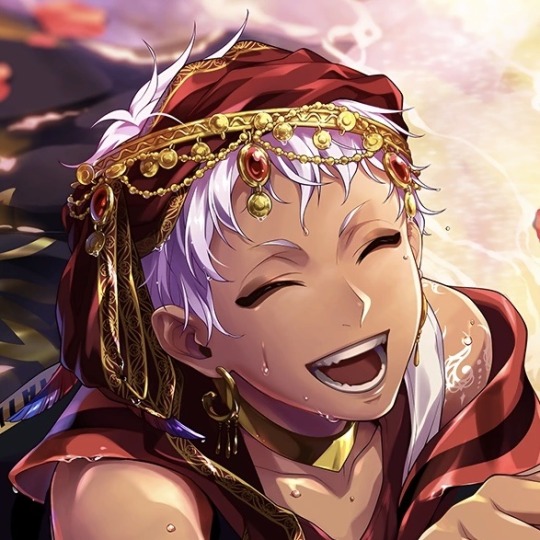
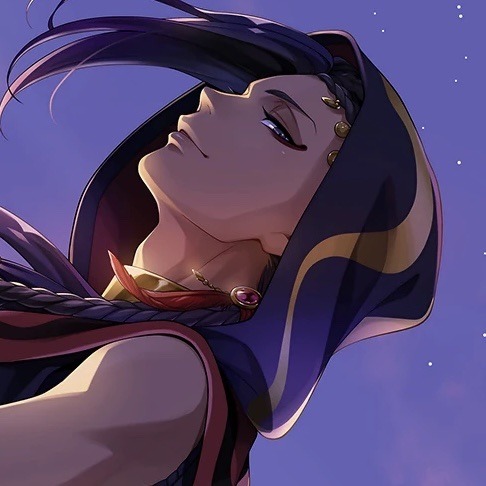
i guess when it comes to the "frying pan sizzling" hot take, talking about my take on kalim and jamil dynamic. but first of all, to be completely frank, i don't think it's fair to just coin them as "master and servant" and be done with it. i mean, yes, they are that, but that statement also needs an asterisk, especially looking through events of books 5, 6 and events (like beanfest).
to put it simply, their relationship is an absolute mess and ten, maybe twenty, can of worms with an ocean of emotional baggage and a sea of trauma.
kalim and jamil are very much like master and servant within the realm of book 4; this is explicitly stated in the japanese version. and if you told me book 4 was the end of the main story period, their relationship probably wouldn't have been as messy. but at the same time even within book 4, we see kalim clumsily trying to make jamil happy as a friend, finding ways to reduce his workload. he clearly very deeply cares for jamil.
that, and... he's also kind of overly dependent on jamil. like, to a concerning degree, almost. but this may partly be because of jamil and his efforts to protect kalim, effectively making it so kalim can't do a lot of things on his own. so, like, jamil's motivations, while they are valid, had shaped a lot of kalim's character to the way he is. and this can be said conversely, too. kalim had dragged jamil along to many of his whims, but i believe it's been shown that jamil had gained an interest in dancing and parrots from none other than kalim. who knows if he would have gained an interest otherwise; he probably wouldn't have found much free time to delve into it himself.
and also, another thing is that jamil held himself back so kalim could appear to be above him. then we see in book 5 that he has never experienced the frustration before. like, whether he deserved it or not, he has always been given the top place because jamil placed himself lower than kalim. so overall, i think it's important kalim has a chance to feel that frustration, which is also proof that jamil no longer holds himself back. that is a big and needed step up from book 4.
and to top it off, bro even uses kalim shamelessly to his advantage in the beanfest event, and in book 6, we see that he (1) says something along the lines of "i never thought i'd be relieved to see your face" and (2) has kalim help him with stuff, which was like unheard of before. like, i know this seems small, and jamil just gave him one task, but that's still a huge step!
at the end of the day, when they all graduate, their dynamic may revert back to the way it was before as if their time at school never existed. since they are on school grounds, a lot of things can escape the eyes of both families, and so jamil and kalim are able to treat each other more as equals. fundamentally speaking, it would not be wrong to say they are master and servant. however, i think even though he probably wants to hate kalim and still holds some annoyance that he has to cover so many bases, jamil still holds some level of affection?? toward him. it's just... a lot more subtle. jamil likely understands that it's not really kalim's fault that jamil is in the situation he is in and that kalim wants to help jamil. but he also knows the problem is so deep-rooted that kalim wouldn't be able to solve it himself in any short amount of time, unfortunately. ☁️
#divider by cafekitsune#twisted wonderland#disney twisted wonderland#disney twst#twst disney#twst#ツイステッドワンダーランド#ツイステ#twst kalim#twst kalim al asim#twisted wonderland kalim#kalim al asim#twst jamil#twst jamil viper#jamil viper#twisted wonderland jamil#twst scarabia#scarabia#30 day twst challenge#stellaris.txt
36 notes
·
View notes
Text
How to write morally grey characters
By WriteAway on Servicescape
Morally ambiguous characters are those that are not simply heroes or villains. They fall somewhere in between, and as such, add a layer of depth and complexity to your story. The truth is that most humans in real life are not pure angels or simply bad people, but rather hold elements of both. Morally ambiguous characters can drive the plot in interesting ways, allow for great character growth, and sometimes end up being some of the most memorable characters in a book.
Morally ambiguous characters can start off with good intentions and then be driven to evil by others or by society, or they can start off evil and come to redeem themselves. Alternatively, they can remain ambiguous and complex throughout the whole narrative, and leave the reader to make up their own mind about them. Either way, these characters certainly make us think about the nature of good and evil and the complexity of the human psyche.
Give them a backstory
Understanding where they came from is important for any character, but it's particularly crucial when your characters are morally ambiguous. Often, the struggles the character went through in the past go some way to explaining their negative character traits now, or at least make us empathise with them a little.
The backstory is important for character development, and it is a great place to explore ideas of personal responsibility vs critiques of society and the results of terrible experiences. Whether your character was bullied as a child, pushed to the margins of society, or something else entirely, give them a rich background that helps us understand why they act the way they do.
Understand their motives
All characters should have needs and desires, and reasons they do the things they do. Often, when it comes to morally ambiguous characters, their motive is exactly what causes them to slip up and do morally questionable, cruel, or destructive things. This can be true whether or not the motive is itself a good one or not.
A morally ambiguous character can be a wonderful opportunity to explore the idea that the ends justify the means, and the corrupting force of power. Whether your character's motives are good but lead them to terrible actions, or whether it is precisely the selfishness of the motives that lead to your character's downfall, give them goals and desires that force them (and the reader) to grapple with choices and dilemmas. And the motives don't have to be as dramatic as the ones mentioned – as with Jay Gatsby in The Great Gatsby, it can be something as simple as a desire to win back a lover that leads a character into moral ambiguity.
Give them a weakness
Going all the way back to ancient Greek tragedies, the idea of the hero with a fatal flaw has lived on in literature for thousands of years. A morally ambiguous character may be fundamentally good, but marred by a particular weakness, such as cowardice, vanity, shame, or anger. The characters in F. Scott Fitzgerald's The Great Gatsby are full of fatal flaws. For Daisy Buchanan it is her vanity and desire for wealth and admiration. For Jay Gatsby it is his love for Daisy, as well as his shame surrounding his background.
Your character's weakness doesn't have to be the ultimate cause of their downfall or even their central character trait. The main point is that they have certain elements in their nature that challenge them, tempt them, or cause them to struggle. It doesn't matter what they are, but weaknesses make morally ambiguous characters more believable, layered, and human.
Give them redeeming qualities
This goes without saying, but you can't have a morally ambiguous character without giving them some redeeming qualities. Whether they are primarily good but are driven or tempted to wicked acts, or whether they are basically villains with good motives or elements of kindness, there needs to be some level of balance.
Severus Snape is often cruel and sometimes corrupt, but he ultimately makes the right choices where it matters. The Artful Dodger is a thief and ultimately betrays Oliver in Charles Dickens' Oliver Twist, but he also helps Oliver and displays feelings of sympathy towards him. Moreover, his actions can be understood in light of his circumstances and experiences.
In the end, it doesn't matter where your character falls on the scale of morality. The important thing is that they have a believable and interesting combination of motives, flaws, and redeeming qualities. If you can get these elements right, you will have yourself a really fascinating, morally ambiguous character.
Let them grow and change
Character arcs are essential to good storytelling. No character should be exactly the same at the end of a book as they were at the beginning. The mechanics of plot are important but are ultimately meaningless if they don't cause development on the part of the characters. However, when it comes to morally gray characters, the way they change throughout the narrative is particularly important.
George R. R. Martin is a master of the character arc. Both of the Lannister brothers are not presented as particularly praiseworthy at the beginning of the series. Tyrion, while harmless, is shown to be philandering, selfish, and lazy. Jaime Lannister, on the other hand, is an outright villain, as he pushes a young boy out of a high window just to protect the reputation of him and his sister. Both go through redeeming character arcs, with Tyrion becoming a paragon of thoughtful justice with a commitment to seeing good prevail. Jaime has perhaps the most striking redemptive arc of the series, but his love for his sister is the fatal flaw that spells disaster in the end.
Many supervillains and other characters experience the opposite type of character arc. In the recent Joker movie, we observe the Joker not as a simple villain, but as someone who was pushed to evil from his experiences and the cruelty he suffered at the hands of society. He begins as a sympathetic character, but by the end he is without question a villain. However, it need not be as black and white as this. Jay Gatsby's weaknesses certainly lead to his downfall, but it is up to your interpretation whether he is ultimately a tragic character or someone who has received his comeuppance.
As we can see, a character arc need not be simple or go only in one direction. Your character can struggle continuously with moral questions, leaving the reader unsure up until the finale what side they will end up on. You can end your book and leave it ambiguous whether the character was ultimately good or evil, or perhaps a very human combination of the too. The main point is that the experiences they have and the actions they undertake throughout the novel must affect them in some way, so that they develop as a character.
Keep the readers guessing
The previous point touches on this, but one way you can keep readers fascinated throughout the whole book is to keep them guessing about the true moral nature of the character and what they will do next. Severus Snape is a prime example of this. We as readers are left unsure right up until the end of the series whether his loyalties lie with the Death Eaters or with the Order of the Phoenix and those fighting Voldemort. In fact, people still argue about whether Snape really redeemed himself enough to be the namesake of one of Harry's sons or not. If your character causes arguments, you have done something right!
There are multiple literary devices you could use to keep your readers guessing. You could pepper little hints throughout the narrative that show the possibility of redemption or allude to potential disaster. Instead of revealing what the character is thinking, you could merely show us their actions, leaving us to interpret them. Alternatively, you could be explicit about the mental struggles the character is going through when making moral decisions. Whatever your method is, leaving things uncertain and keeping various possibilities open is what makes the audience want to keep reading.
Give them difficult choices
Choices often drive plot and character development, and difficult decisions are a central way in which authors can allow ambiguous characters to struggle with moral questions and keep readers guessing. The choices that these characters make can redeem them or be the catalyst for their downfall. Snape's decisions to join the Death Eaters and later to leave and join the fight against them, is the cornerstone of his character development and much of the plot of the Harry Potter series. Jay Gatsby's initial decision to lie to Daisy about his background is the key choice that leads to his life of dishonesty and unhappiness.
In many cases, the choices that characters make are key events that determine the shape of a book. They are also great opportunities to explore difficult moral questions and dilemmas. Maybe your character has to choose between the greater good and personal desires. Perhaps they are faced with a decision that hinges on loyalty to loved ones versus making the moral choice. They could be tempted by greed, vanity, cowardice, or anger. There are so many difficult choices you can force upon your characters.
Not only can such decisions drive the narrative of a book, but they can also make readers think about very real dilemmas they face in their own lives, and broader questions about the nature of "right" and "wrong." A really good book doesn't just entertain us, but makes us think and forces us to come to our own conclusions. It makes us consider things we may not have before and leads us to apply ideas to the real world, no matter how magical the setting of the book is.
Focus on relationships
Often, the decisions that a character has to make and the experiences they go through are closely linked to other characters. In the case of Frankenstein, the central relationship is between the monster and the scientist who created him. It's not a relationship that involves much contact, but it is what the narrative revolves around. Relationships can redeem, such as Snape's love for Harry's mother Lily. Alternatively, they can cause a character's downfall, such as Jaime Lannister's incestuous relationship with Cersei or Gatsby's obsession with Daisy Buchanan. Relationships are a great motivating factor for morally ambiguous characters, whether they lead to temptation, redemption, or other moral challenges.
In addition to that, it's important to consider the conflicting motives and forces informing all of your characters. Although not all your characters need to be morally ambiguous, they should all be complex. Even the most heroic character can struggle with temptation and can make the wrong choice from time to time. Even the evilest villains should have elements that we can empathise with or moments of kindness. Otherwise, they are nothing more than a caricature. That does not mean that you cannot have people who are essentially good and those who are essentially evil. However, inserting a little ambiguity into all of your characters makes them more authentic and human. Each character should be well-rounded, believable, and multifaceted. Writing explicitly morally ambiguous characters can help you make better characters all round.
#writers on tumblr#writing#story writing#teen writer#writers#writers block#writing inspiration#writing tips#creative writing#writing advice#writeblr#writersofig#writersofinstagram#writing prompt#characterisation#character development#villain#hero and villain#villains and heroes#heroes and villains#morally ambiguous#morally gray
614 notes
·
View notes
Note
I noticed that you have made it clear that you are not one for the first Sonic the Hedgehog film. And I must make it clear that I respect your opinion on it; it is not for everyone, even all Sonic fans.
However, I get a feeling that you are antipathetic to the future installment(s)- you mentioned some time ago you have not seen the second film. But even if you were underwhelmed by the first film, do you believe that they cannot improve?
in the wake of the trailers of the Super Mario Bros movie, I have seen things like "I used to like the Sonic movies, but since the *trailers!* of the Mario movie came out, the Sonic movies suck now!". Do you believe that is really a "correct" way of thinking? Like, regardless of what one thinks of the movies, should people just dismiss all the hard work that people like Fowler and Tyson Hesse put into the films just because they aren't animated like the Mario movie? Or that they don't use much of the game music, like the Mario movie? is this truly shaping up to be a "1:1 or nothing" thing, leaving no room for deviation?
I ask this because I feel that rational StH fans are as rare as hens teeth, especially these days; consider yourself a hens tooth

The biggest issue I have with these movies is the foundation it laid for itself.
Cue TL;DR rant mode
Let's be absolutely frank and honest with ourselves. The first movie was only saved purely because the controversy of Sonic's design led to him being revamped entirely and Eggman's portrayal was solid. That's really it. I'm not against human characters showing up at all, on the contrary. But this set up is "Take the most superficially basic concept of Sonic then make a bunch of convoluted revisions to the lore of the original series to justify isekai-ing him into San Francisco so we can save money on animated scenes". Like, it's the same problem most children's media being adapted into "live action" suffers from. It's a cheap, lazy adaptation that broke absolutely zero ground and I've held this opinion of it literally since the day it was first revealed and announced with those leaked posters of Chris Pratt and Sonic's initial design.
And just because it didn't end up being as "bad" as it first looked and they brought on actual, talented fans of the series onto the creative team, doesn't suddenly detract from this most basic, fundamental problem. Sonic's movies suffer from what happens when you let Hollywood just go to town on your IP and barely give it proper boundaries to stay in.
Even if they manage to get SOME things right like, Knuckles actually being cool again and the Giant Robot fight at the end of the second film, the reality is they'll still be tied down by the flimsy foundation they started on, like dragging on a wedding scene or putting waaaay more focus and attention on the human characters than the.....main characters we came to watch???
Now compare that with the Mario movie. From the start, Nintendo I understand had a MUCH bigger involvement on the production. It's not like the lame adaptation I mentioned above. They went full on "Angry Birds" level of staying on brand. The entire world feels like the natural, fleshed out idea of "How do we make this feel as warm, inviting, and fantastical as the games but still make it work as a movie?" It's actually BRILLIANT just from first impressions.
I'm sure it's going to suffer from other typical kids movie problems like "Peach's a STRONG WOMAN NOW because she wears PANTS and DON'T NEED NO RESCUER", dumb movie writing or Mario, Luigi and Peach's flat voice acting. But you cannot look at that movie, how it just unabashedly looks, feels and is completely imprinted in Mario and say that Sonic had anywhere NEAR the same level of enthusiastic production on it. I mean, even the cute commercial of their plumbing business in New York is entirely animated and ALSO feels like it fits. They went to the absolute nines with making this feel like a WAY better adaptation in spirit, story and visuals.
Of course I appreciate the hard work the team put into saving the Sonic films from becoming absolute jokes but WHY did it even have to be so compromised in the first place when Mario shows up looking EXACTLY like how I've dreamed Sonic's movies would've been treated?
I'm not wooed over by the small glimpses of Sonic's world or the tiny references they managed to squeeze in there. I'd appreciate those way more if it were ACTUALLY set in it. And I cannot stand this prevailing narrative that "Sonic's world is separate from Earth" in most of these adaptations because it's not! It IS Earth! He's always lived in the same planet as humans, their animal kind is just reclusive and live on islands. That's the actual lore of the games!
This movie made the mistake of doing what Sonic X did. They think it'd be "too weird" for someone like Sonic to have been from Earth as if the intense popularity of it in the first place isn't enough to show how wrong that is? No kid questioned Sonic showing up in City Escape around humans any more than dinosaurs or other crazy entities existing in Dragonball's version of Earth. It's still Earth, just fantastical.
Mario works with that because him iseaki-ing into Mushroom Kingdom is that original lore of the games too I believe. But in Sonic's case it's not and it's so JARRING because they think Sonic himself can't carry a story as the main character. No, kids need a human or avatar to help them navigate the weird, unexplained parts of the series. I'd rather they'd just do that with Sonic himself without needing to be forcibly tied to a regular human. (I'm so annoyed that he couldn't have just run to San Francisco if he wanted because he "needed directions". What a pitiful excuse. And these movies are FULL of them like that.)
Hollywood is a joke and they cannot for the life of them, understand how to effectively adapt most Japanese properties by themselves. Especially anything even remotely inspired by anime like Sonic.
I know this might make me look like "the most offended Sonic fan in the world" right now but in all honesty, I don't really think about those movies much. They function as effective promotional materials for the games and kids like them so whatever. Like, it's just one big Shrug really.
*sigh*
192 notes
·
View notes
Text
Why Manga Asura does not Work as the final antagonist

Regarding the final bit of the Soul Eater Manga, there is a LOT that does not work.
Crona sacrifice and sealing the moon might sound good on paper, but it doesnt fit the themes of the story. Maka never really managed to hit the final note of her character development that anime Maka did, and at the very end regressed, as she rejected her father out of spite. Kid making peace with the witches was nice, but the manga never really delved into the conflict between shinigami and witches in full and what it truly involved, so the conflict being resolved was sorta half baked.
But one of the things i dont really see brought up that often is how the final villain Kishin Asura does not work. At least not the manga version of him.
He is frankly speaking, a terrible final antagonist for the manga. Not just as an actual character, but also on a thematic level.
Asura as a character all throughouth the story before the heroes encounter him on the moon, has been all about 2 defining aspects about him, two things that has defined his very being.
Overwhelming power, and fear. The Kishin that became THE moster of legend for the Soul Eater Universe, who killed and consumed his own weapon along with two other of Shinigami's Warlords(who may or may not have been great old ones as well) is legendary for his overwhelming power... But also being a massive coward.
Such a coward was he, that he eventually devoured his own weapon, his partner, rather than even risk the possibility that he might turn against him.
On paper, he sounds he is the perfect foil as an antagonist for the Soul Eater protagonist, especially the main character Maka. For a story that is defined by people opening themselves up to others, even despite the pain that might very well ensue from that, to have the villain be one who gave up on everything out of cowardice, and sought ultimate power in hope that it would lead to total safety for him rather than taking a risk on the dangers of life and bonds makes perfect sense.
However, there is a problem.
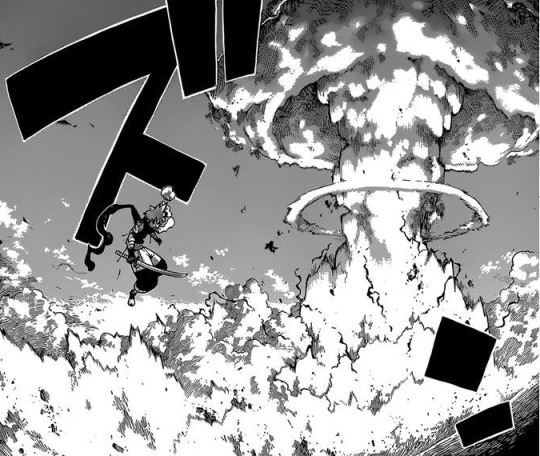
Namely that while Asura has the overwhelming power down pat, the coward is essentially a complete informed attribute.

While Asura has moments where he is seemingly terrified on the moon, this is not genuine fear. He is simply mocking the protagonists by showing "Fear" and basically saying "oh, how scary" in face of his foes.
It's not genuine fear. There is not a moment on the moon, where Asura is genuinely, honestly afraid of the protagonists.
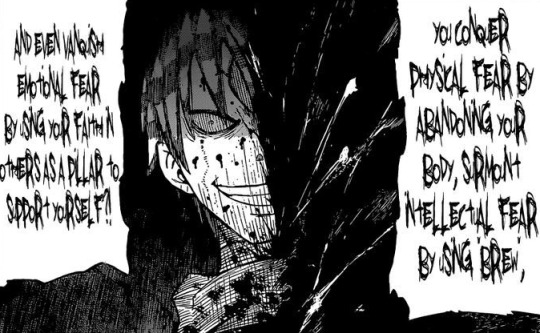
Hell, not even at the very end, as once again he's being sealed away, does he show a lick of fear at the prospect of once again being sealed away in darkness.
Instead he shouts definatly that fuck you guys, i'll be back!
This complete of lack fear has two massive problems.
The first is simply that he's a BORING character.
Manga Asura is a boring villain. He is every single, bland, overpowered final boss that plagues shonen as a genre, withouth anything that makes him stand out from the mold.
As such seeing his conflict with the heroes is basically them beating up on a brick wall... Only at least most villains in this mold does have the satisfying moment where they do break, while Asura remains undefeated, thus leaving no sense of closure.
He has no charisma, he has nothing interesting to say, and he is not particularily fun to watch.
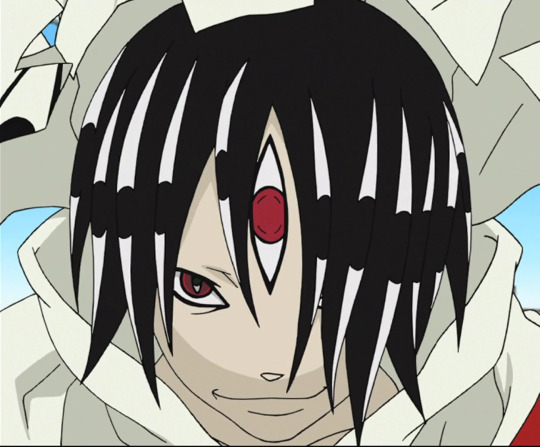
He is basically the exact opposite of his animated portrayal, who was a giant coward... But also had a surprisingly poigaint amount of things to say, having debates with his father during their final battle where the two beings who fundamentally could not understand bravery, tried to give their own viewpoints of what this bizarre thing could be.
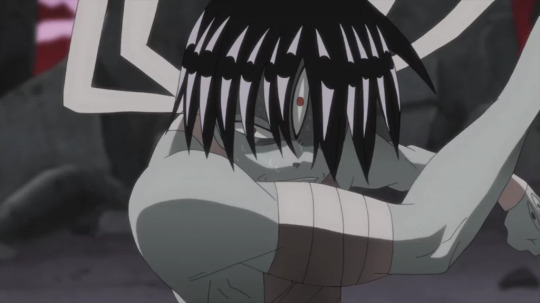
And of course, because anime Asura really was a giant coward, and all his fear was absolutely genuine, when he finally breaks down at the end, it feels satisfying on a story level, because we understand how he ticks, and what has lead up to this point.
But it goes beyond just the fact that Asura is a far more engaging and dynamic character in the anime.
There is also the themes which the story embodies, which are explicitly rejected by the manga version.

Asura Looks down on Humanity, regarding them as Shingami's puppets, and scum.
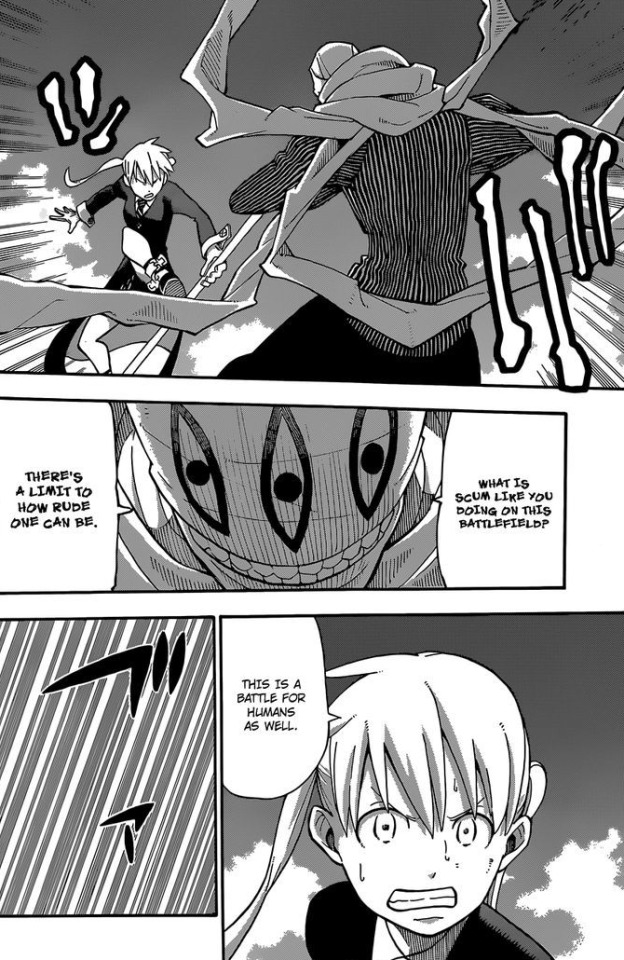
More speciffically, the real reason he looks down on them is because of their, in his eyes, weakness.
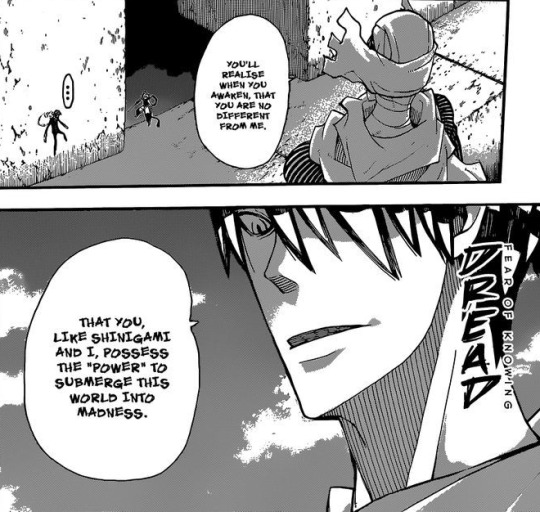
When facing his brother, the only thing he cares about when comparing the two of them is strength.
Because that is the metric by which he lives his life.
He sought out strength with the goal of never having to be afraid again. He wanted to be strong to feel safe, to never have to feel fear, ever again, because in his mind, if he was the strongest, nothing could challenge him.
He rejected all bonds because he was scared of the possibility of being hurt.
In other words he is thematically the opposite of all of Soul Eater's main heroes.
He is the opposite of Kid, as a warning of what the Shinigami could become if he gave in to all his worst aspects.
He is the opposite of Black Star, as a man who sought the absolute top, but threw away everyone and everything that ever mattered to him to get there.
He is the opposite of Crona, who's is able to draw strength from one, single bond with another human being that is defined by love between the two of them, hard and painful though it might be at times.
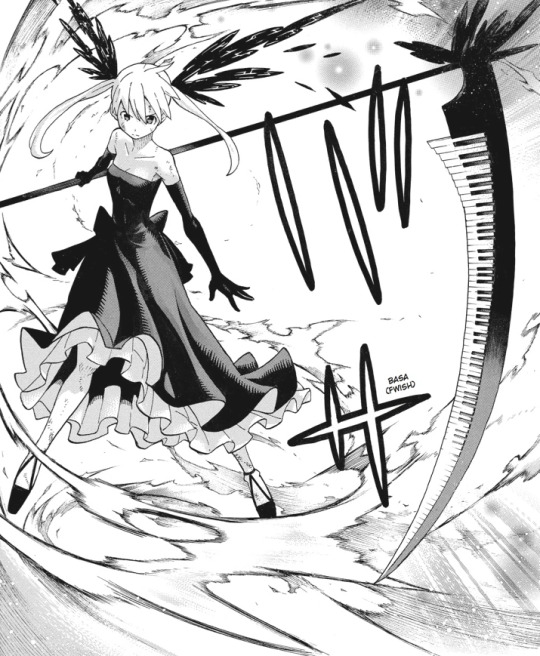
But the single person who Asura is an opposite to is Maka Albarn, who represents absolutely EVERYTHING that Asura has rejected, and looks down on.
Maka is not a particularily strong warrior as far as Soul Eater's powerlevels is concerned. While far, far above the normal human limit in every physical regard, compared to the likes of endgame Black Star and Kid, she way below them in overall combat capacity.
But that is not why Maka is a great fighter. Maka is strong, not because of her base power being stupidly high, but her ability to bring out the best in everyone around her.
This is encapsulated by her abiltiy to bring out the best performance of every single person on her side through soul syncronization... Something she is only able to do thanks to her partner Soul, and the trial and tribulations she went through to get here, including both falling on her face along the way, as well as rejecting her feelings of inaduquacy when compared to the sheer power gap between her and black star.

And of course, her defining relationship in this series, her bond with Crona, is about doing the exact opposite of what Asura did with his own bonds to his partner and father, and comrades.
Asura killed and absorbed 4 of his own friends, and tried to do the same to his father, because he feared those bonds and the uncertainty they had... He rejected the best things in his life because he could not handle the fact that they were not certain things, that they could in fact go wrong... So he sacrificed them in exchange for the ephemeral safety of power.
By comparison, Maka refused to give up on her relationship with Crona, no matter how much logical sense it might make, and how much the people around her migth tell her it was the better option, because Crona mattered to her. The bond they shared mattered to her. The love she had for Crona was stronger than the fear of being hurt.
This is the reason why Maka is the Hero of this story, while Asura the villain.
In other words, even if Maka and Asura does not have a deep and complex relationship like many heroes and villains do, thematically speaking, they are the exact opposites.
Asura represents everything that Soul Eater sees as bad. Fear of others, cowardice, power for the sake of power, and rejecting an uncertain future.
Maka represents everything Soul Eater sees as good. Love for others, Bravery, seeking power not for the sake of yourself but for those around you, and having the guts to embrace the future, regardless of how uncertain it might be.

It is the reason why the anime final fight, despite some hickups and misteps getting to maka's charge up the hill and the final punch, works.
This was the climax of the story, and in the end, the story rejects Asura's claim of ultimate power being the key to safety from fear.
It brought all of Soul Eater's themes together in one, final sequence where Asura's ideals are broken to pieces in the face of Maka's hope, dreams, and love for everyone she cares about, just as decisively as his face was.
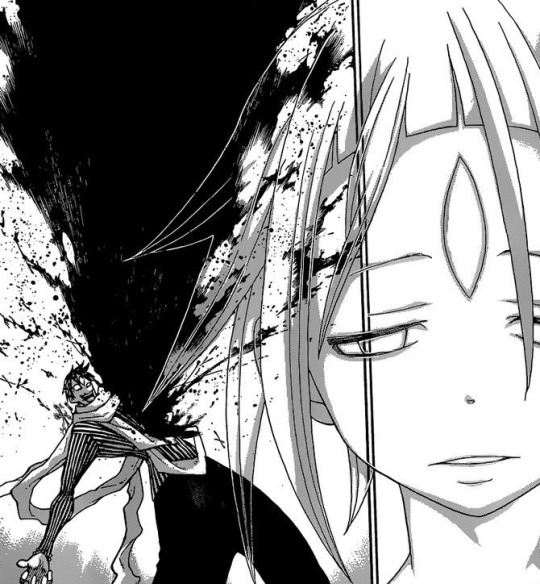
One of the Manga's climax's themes, is that Asura was... Kinda proven right by this ending.
The heroes did not in the end manage to overcome him, thus in it's own way, proving his faith in his own power right.
Rather than ultimately stating that power is ultimately meaningless, ephemeral, and not what actually matters in life, Instead Asura's strenght is allows him to live on to fight another day.
This his quest for power, and the sacrifices he made for it... Was actually kinda worth it in the end. Becasuse he was right. His godlike powers DID keep him safe and alive in the end, with the hope of one day breaking loose and continue his onslaught upon the world strong in his heart.
And that is one big denouncement of ALL of Soul Eater's themes, and it's overall message.
#soul eater#kishin asura#maka albarn#black star#crona gorgon#shinigami sama#meta#meta analyis#themes#broken aesop#fear#power#madness#bravery
34 notes
·
View notes
Text
So, Majin Buu....

Thinking back on the original Akira Toriyama Dragon Ball run, it's pretty clear to me more than ever that Majin Buu, the final major villain of the series, the Big Bad in the story arc the series ended on, was by far the weakest Big Bad out of all the powerful, action-based Big Bads, making him second weakest overall next to Commander Red. Yes, even Tienshinhan was an overall more satisfactory main antagonist compared to how Buu got by the end. And for the longest time I just sort of took that as a basic truth without really examining why it was. I'd thought the main reason for it was that the concept of him as this ages old evil that was only just now being pulled back into the present day limelight to be the new all-powerful threat to the universe to surpass the last all-powerful threat to the universe was really cheap, as it felt like Toriyama lazily re-doing the premise of King Piccolo only more ancient and a threat to even the gods of this world's cosmology and lore. But if I'm being totally fair and honest, that shouldn't necessarily be a definitive restraint on Buu from reaching villainous greatness. After all, Buu is also a great concept for a villain and an undeniably original, distinguished, uniquely Toriyama one at that. He so easily could've worked. Why didn't he?
This year of Toriyama's passing, it finally dawned on me - Majin Buu suffered from the same syndrome that would years later plague Xehanort from Kingdom Hearts. The syndrome of being a single character yet having so many different variations of him that feel like completely separate characters that makes it hard to reconcile them all as a single entity or to understand who that single entity is at the most fundamental level and what they're all about personally and in terms of narrative function. And indeed, it is only Buu who suffered this problem. Piccolo Jr. felt like the spawn/second lifeline of King Piccolo, Vegeta as a Great Ape still felt like Vegeta, Freeza in all of his transformations still feels like Freeza, Cell is still Cell in all three of his forms (even with his brainpower being more easily expended in the Semi-Perfect form), the Zamasus all feel like different variants of Zamasu, Moro, Mechikabura, and Demigra always feel the same, etc. Yet Majin Buu feels like he becomes four or five different people over the course of his saga, which gets either unnecessarily lengthy or incredibly rushed depending on the medium you're looking at it in!
So here's basically how I feel about the Majin Buus:
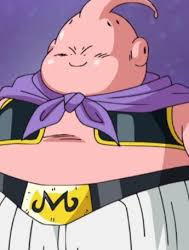
Fat Buu, AKA Mr. Buu - Toriyama first created this character to be the Majin Buu, a complete subversion of expectations for how this all-powerful evil demon was built up versus how nonthreatening he appears to be once we meet him. The simple-minded, infantile, playful, whimsical and sweets-craving nature of this Buu is both the source of much comedy and becomes a source of tension that enhances the dread you feel whenever the deep malice he harbors within him comes out on display, as the tonal whiplash of this silly, chubby pink blob getting mad and doing horrible things is unnerving. But in addition, we're made to feel some sympathy for Buu since Babidi treats him in an abusive, exploitative way and it becomes clearer that for all the malice he has and all the wrongs he commits, Buu has the mind of a small child who does whatever he wants to do for fun in total innocence and naivete, not knowing or understanding what the morally right things to do and the right way to live are, and why things like killing other living creatures is morally wrong. The stuff with him and Mr. Satan is some of the best content in the entire saga, and it feels right that he joins the family and becomes one of the good guys in the end, even if not much really comes of that in future installments. I give him an 8/10, to me he's the Best Buu.

Evil Buu, AKA Slim Buu - I mentioned the deep malice within Buu that he was born with, and this guy is the physical personification of it that Fat Buu conjures out from him during a breakdown where his desires are clashing with what he now knows about right and wrong. Visually, he's the exact 180 of Fat Buu - lean face and skeleton-thin body, open eyes that are black with white pupils, dark blue cape rather than a purple one, and he's the only Buu who's not pink but is instead gray. But he's the Mr. Hyde to Fat Buu's Dr. Jekyll, another side of the same person. Were Fat Buu to defeat him, he'd conquer his inner darkness, but instead this thing defeats and swallows Fat Buu, signifying that the inner darkness has won out and will change Buu's shape into something stronger and more evil. Ultimately this Buu has no personality to speak of besides "evil" and is only there as a plot device to up the tension and stakes again by becoming the new eviler version of Majin Buu who has no qualms disregarding the lessons he'd learned from Mr. Satan. However, he does get some extra points for killing Van Zant. 4/10, Basic Buu is Basic.
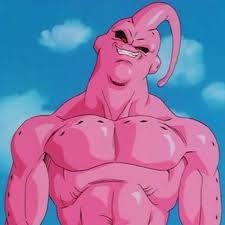
Super Buu - I really like this Buu yet am really mad at him and have a bone to pick with him. 'Cause he feels so easily like the Buu I'd love the best after Fat Buu, owing a lot to a truly stellar introductory period, solid voicework in the anime, and much like Cell, some cool and catchy theme music from Bruce Faulconer in the US dub. He starts off so cool: popping his neck, yawning, sagging, screaming, and cackling maniacally in the course of seconds after he's formed, showing devastating power and killing Smitty in the most graphic and disturbing way, flying all the way to Kami's Lookout just to fight and kill his enemy, distinguishing himself from the well-spoken likes of Freeza and Perfect Cell by speaking very simply, responding to Piccolo's demand of him by simply and efficiently killing off the Earth's human population, nonchalantly turning a furious Chi Chi into an egg and not even bothering to eat her (he kills her by stepping on the egg), and retaining all of his hilariously childish dumbass qualities and sweet tooth yet possesing a raw, dangerously savvy cunning beneath his brutish exterior. And yet through all this, he it doesn't really feel like he's properly motivated in evildoing other than "he's evil", and more problems start to pile up once he and Gotenks are going at it in the Time Chamber dimention. For every golden moment he gets, he gets some ill-concieved moments (though in fairness, he shares them with Gotenks and Piccolo): it's he who instigates the "wall-breaking/plot-breaking scream". But not even that could ruin him. No, when he really does the unforgivable is when he turns into the next Buu. So he's a 7/10, should've been Buuetter but wasn't.
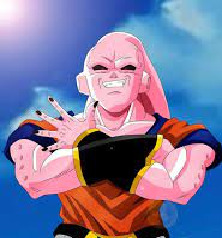
Mystic Fusion Super Buu - Is just Fusion Super Buu when he absorbs SS3 Gotenks and Piccolo, the "Mystic" is added when he absorbs Gohan. Yeah, the problem is immediately apparent in that premise. Since when could Majin Buu absorb anyone and add their Ki power to himself? That was Cell's shtick, Majin Buu was all about transforming his prey into sweet treats and eating them up. He got the ability to take other fighters and their powers into himself from right out of Toriyama's ass! On top of that, he now looks hideous, with a long head antenna like SS3 Gotenks' long hair, a nose and facial features like Piccolo, and he trades out between Piccolo's, Gotenks', and Gohans' clothes, and neither look good on him! On top of that, his characterization changes as with Piccolo's intellect, he starts speaking in complete sentences and elloquently articulating everything which is just....no. Don't. This is killing Buu's unique vibe! On top of that, him defeating and absorbing Gohan is an utterly cruel slap in the face of any fan who might've actually wanted to see Gohan's ordeals and new power paid off by him being the hero to defeat Buu in the end like such a set-up would normally entail. And on top of all that, he's just a bore now. The whole section of the story where he's around has always failed to interest or excite me, he's just not fun to look at, watch, or listen to, and his existence is what derails Gohan's arc, brings Goku and Vegeta as co-heroes in the spotlight, and stretches things on the barren Earth out longer than necessary, including a gross, unwelcome trip inside of Buu's body! Near the end he loses his shirt and shows his character again, and we get the welcome return of classic Super Buu for one last stand-off, but that only bumps his score to 2/10. Buuuuuuuu, you suck!

Kid Buu - Buu's final and also primal form. He's not only the most powerful, destructive, and maniacal Buu, but this is Majin Buu as originally concieved in-universe. When Bibidi first conjured him into this realm, he was like this - a living, breathing force of pure chaos who lives only for the slaughter and devastation that he finds fun. And he does work as being just that, retaining Buu's mixture of being comical yet also terrifying and dangerous. Almost everything that concerns him and the section in which he's the opponent/obstacle to destroy is perfectly fine, aside from Goku being the hero rather than Gohan and how drained you feel from all the earlier Super Buu antics, it all works and makes for a properly tense, thrilling and epic final battle against a worthy final boss for this saga. The issue with Kid Buu can found within his character set-up and in the way he gets implemented into the saga. We'd been given nothing foreshadowing his existence as the OG Majin Buu until after Super Buu has reverted to him. We had no reason to think that Fat Buu wasn't the default for Buu, nor any reason to think that this new Buu would be that much more powerful than the Buus that preceded him, making Kid Buu feel really, really cheap. For that matter, how does removing Fat Buu from inside of Buu revert him to Kid Buu yet Fat Buu expunging the Evil Buu from out of him didn't have that effect on either Buu? And as is said in this post, "Kid Buu’s defeat doesn’t feel as satisfying as it should because we barely spent time with him compared to Super Buu", and that when Kid Buu comes along to take Super Buu's place, in the manga it's in the last graphic novel volume of the series, the very same that began with Vegito VS Mystic Fusion Super Buu, while in the anime it's the point when "you’re about ready to scream “Oh my Kami, END already!” given how fatigued you are of watching Super Saiyans fighting this pink monstrosity by then. Ultimately, Kid Buu's a 7/10 - Buu Bye and guud riddance, Janemba did it better.
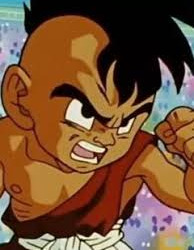
Uub - The reincarnation of Kid Buu, who before getting killed had been Mystic Fusion Super Buu, and Super Buu was previously Evil Buu before eating Fat Buu, who Evil Buu came from making Evil Buu and Fat Buu two different variants of the same being, so that guy gets reincarnated due to a wish to Shenron by Goku even though Mr. Buu is still alive as a separate being....yeah, the dissociative identity of Majin Buu and the flimsy idea of all forms of Buu being the same character really collapses here, and fittingly on a character whose very existence and the reasons for it, in-universe and out of it, are completely nonsensical. If Goku really wanted to keep Majin Buu as a sparring partner but only if he was a better person, why not start training Mr. Buu so that his power could grow to match Kid Buu's? And are we really expected to believe and be okay with the idea that the successor to Son Goku ends up being not Gohan, not Goten, not even Pan, but the hastily introduced in the final two chapters reincarnation of the last villain who we were also only just introduced to in that very volume of manga? I can't pretend to know exactly what Toriyama was going for when he wrote the epilogue in those last two chapters and came up with Uub, but if that was his way of leaving the door open for Toei Animation to continue the franchise on their own terms, it's pretty telling that GT had no interest in picking up on this thread and rendered Uub completely worthless, and we've seen no more from Uub in the DB continuations we've had since. Uub and the ending associated with him were just a total Uuber failure. 1/10.
#Dragon Ball#Dragon Ball Z#manga#anime#Majin Buu#analysis#opinion#criticism#Mr. Buu#Evil Buu#Super Buu#Kid Buu#Uub#they wasted a perfectly good character#Akira Toriyama#anti majin buu
11 notes
·
View notes
Note
Ok after finishing all of the main story content in Samurai Remnant, I'd really like to know your thoughts on not just Saber, but the other new servants as well. (I know you did Rider already so maybe you could talk about her Avenger form added recently to FGO)
Saving the Iori and Saber posts for after I play Entreat the Darkness but I suppose I can do this one now.
FSR's cast is built like Fate/EXTRA's. You have big arcs for the protagonist and the main Servant. And then every other Master is a supporting character for the protagonist's arc and their Servant are supporting characters to those supporting characters.
Zhou Yu is the golden example of that. He is the guy who understands Zheng's position, relates to his experiences, and serves as the model for Zheng to follow after every ending. He's not very explored in the parts of his character that aren't relevant to that, in the same way Zheng isn't very explored in the parts that aren't meant to show the ways he's similar to Iori. Although this is probably guaranteed to change when he goes to FGO because Zhuge Liang is right there hiding inside his Waver Velver skin.
Jeanne is the same Jeanne we know since Apocrypha, except in serious mode 100% and in a Master-Servant pair where both sides have firm opinions about the other side's life choices and refuse to back down there despite their fundamental disagreements. FSR and its collab event were the only two times I came out of a Jeanne story having zero problems with Jeanne's characterization, which is a major testament to how good Chiemon is and how Jeanne plays an essential part in making Chiemon the best.
Ushi Gozen is already covered here and here.
Are is different in that he exists as a personal antagonist to Saber rather than as a supporting character to either of his Masters. Saber's arc is about becoming more than Yamato Takeru, so they fight a boss who has the literal constraints of Yamato Takeru's story as his Noble Phantasm. He has his own personal goal in evidencing his own existence, but that's a really frustrating concept as it is because it doesn't give Type-Moon's reasons why Are's existence is doubted. He's a character I have ideas for how I'd have done him differently, but that's a topic for its own post.
Saburou is an accessory to Dorothea's character but he's the most poorly communicated character in the game, so he muddles the point of Dorothea along with him. His motive for wanting to test Doro is not stated but it's implied to be simply disagreeing with her decision to retreat instead of storming Yasuhiro's fortress in their last Digression, which really makes him come off as just an asshole. And I feel like more could be done with the arrangement of him and Saber being mutually weak to each other.
Musashi is the one Servant who serves as a supporting character to Iori rather than her own Master and she feels a lot more right in this role than she ever did as a main player. She's the one character who understands Iori's arc through personal experience and ultimately tries and cathartically fails to be a source of closure to Iori, the other Musashi, and to a lesser extent herself, all in a single duel. It's a satisfying loss for everyone involved.
Yoshinaka is an odd Rogue who is stripped of anything and everything that defined Yoshinaka's source character. Making Yoshinaka a good guy because they didn't want Tomoe to be heads over heels for the worst man of his time is understandable, but the narrative that Yoshinaka was unfairly hated comes with reasons why he was hated despite being innocent, and the game doesn't bother to work with that either. Their Yoshinaka is just a nobody who exists only to be Tomoe's man.
Samson is the Rogue who exists to be Takao's supporting character since Musashi is busy being another one of Iori's. He's a screamy Berserker, but for the first time, this archetype worked because the 3D models allowed for new levels of expressiveness, such as the thumbs up and him sitting next to Iori's house pouting. He's as much of a simp as any version of Samson should be and the way Takao treats that giant hulk like a baby is pretty cute. He's just nice to have around, especially when he is playable.
16 notes
·
View notes